In Focus This Week
Building Operational Resilience
Preparedness in the Face of Disasters
By Kevin O’Reilly and TJ Pyche
Less than six weeks before Election Day 2024, Hurricane Helene made landfall in Florida as a Category 4 hurricane, and proceeded to cause destruction throughout the Southeast, including in North Carolina, where more than 100 people died in what has been called a 1,000-year flood event. Hurricane Milton hit Florida again just ten days later.
 Helene and Milton destroyed some polling locations and left others unusable. They wiped out roads, took down telephone poles, knocked out electricity, and left communities without cellphone service. Elections officials were left to pick up the pieces at the same time that they dealt with their own personal loss. A recent report from the Election Infrastructure Initiative estimates that the affected counties face approximately $120 million in recovery and restoration costs.
Helene and Milton destroyed some polling locations and left others unusable. They wiped out roads, took down telephone poles, knocked out electricity, and left communities without cellphone service. Elections officials were left to pick up the pieces at the same time that they dealt with their own personal loss. A recent report from the Election Infrastructure Initiative estimates that the affected counties face approximately $120 million in recovery and restoration costs.
Disasters like these don’t announce themselves, and they can cripple the electoral process.
Election offices in the Southeast and across the country already take steps to prepare for the worst. But as a professional community, it’s important to collectively do more. To start, here are practical steps election officials can take to strengthen readiness and resilience, safeguarding both their operations and the democratic process itself.
Establish Emergency Management Relationships Early
No election official should be scrambling to find a phone number for their local emergency management director on Election Day. Proactive  collaboration between election offices and emergency services can reduce delays and confusion when a crisis hits. Building trust and communication lines now – and asserting the importance of election officials’ spot at the table – ensures everyone knows their roles and responsibilities when emergencies unfold.
collaboration between election offices and emergency services can reduce delays and confusion when a crisis hits. Building trust and communication lines now – and asserting the importance of election officials’ spot at the table – ensures everyone knows their roles and responsibilities when emergencies unfold.
Take, for instance, North Carolina during Hurricane Helene. Many early voting sites were destroyed or inaccessible, but partnerships with emergency services allowed officials to mobilize alternate voting locations quickly. These relationships made it possible to ensure access to voting in the face of severe flooding.
Develop Flexible Contingency Plans
Preparedness doesn’t mean just having a plan—it means having multiple, flexible plans. The most predictable aspect of any disaster is that it will  be unpredictable. No two scenarios will unfold exactly the same way. During Hurricane Milton, Florida’s Manatee County had to consolidate polling locations while simultaneously navigating getting correct information out to voters.
be unpredictable. No two scenarios will unfold exactly the same way. During Hurricane Milton, Florida’s Manatee County had to consolidate polling locations while simultaneously navigating getting correct information out to voters.
Election officials who conduct regular scenario-based exercises and tabletop drills are better positioned to adapt under pressure. These exercises help teams identify blind spots and fine-tune their responses to everything from flooding to bomb threats. Additionally, these activities provide election officials and other partners the opportunity to enhance election procedure documentation.
Diversify and Secure Critical Resources
Election offices need redundancy built into their operations. Natural disasters often result in power outages, road closures, and other logistical hurdles. Missouri election officials learned this in 2024 when Election Day storms flooded polling places and disrupted electricity. Generators kept some sites operational, but not every jurisdiction had access to emergency resources.
Investing in robust backup systems and training staff on emergency protocols can reduce vulnerability during critical periods. Understanding the 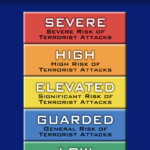 resources needed to continue the voting process is essential.
resources needed to continue the voting process is essential.
Communicate Early and Often
In moments of crisis, clear communication with voters is vital, and election offices must act swiftly. During the 2024 election, some counties spent tens of thousands of dollars mailing polling place change notices after hurricanes and other events forced last-minute relocations.
It’s critical to have a rapid-response plan for voter communication. A network to communicate with, however, can’t be spun up immediately in the event of a crisis, so committing to multiple methods of communication to voters (emails, text messages, mail) when  there are no crises pays dividends.
there are no crises pays dividends.
Champion Sustainable Funding
Moving from disaster response to readiness and resilience requires sufficient, consistent investment. Emergency preparedness, staff training, infrastructure upgrades, and contingency resources all come with a price tag. Many election offices operate on razor-thin budgets, relying on emergency appropriations to cover the costs of disaster response.
Securing long-term funding—particularly federal funding that fills critical gaps in local government budgets—both ensures that election offices can invest in preparedness rather than scrambling for resources after a crisis hits. Reliable funding also enhances public trust by reducing delays and disruptions at the polls.
The time to prepare is now. Start building your election resilience strategy today, and if you need support, don’t hesitate to reach out.
Kevin O’Reilly is the organizing manager for the Center for Tech and Civic Life. TJ Pyche is the director of communications and program operations for The Elections Group.
electionline Daily News Email
 What’s the best part of waking up? electionline Daily News in your inbox of course so be sure to sign up for your daily dose.
What’s the best part of waking up? electionline Daily News in your inbox of course so be sure to sign up for your daily dose.
Each morning you’ll receive the top headlines of the day, plus a listing of states featured in that day’s news round up.
To sign up, simply visit our site and provide us with your email and you’ll begin receiving the news in your inbox each morning.
Election News This Week
 Jail Voting: According to new data, jail voting has risen in Colorado since the passage of a new law in 2024 that requires county sheriffs to designate someone to help eligible voters in jails cast their ballots. According to Colorado Newsline, Kyle Giddings, deputy director of the Colorado Criminal Justice Reform Coalition, said data he has collected from county clerks and the secretary of state’s office show that over 2,300 people voted from jail in 2024, compared to 231 voters during the 2022 midterm elections. That includes in-person voting and those who submitted a mail ballot. “Across the board, everyone really stepped up to the plate and got it done,” Giddings said. Jefferson County Clerk Amanda Gonzalez, who is running for secretary of state in 2026, said she’s proud of the turnout her county saw during this election. In the 2022 election, before Gonzalez was clerk, three voters cast a ballot from jail, and in 2024, the county had 348 people vote from jail. “I want to continue to see this program expand — I want to see every single eligible voter participate in our democracy — but I am really proud that we made a significant step forward toward that goal during this cycle,” Gonzalez said. Arapahoe County Elections Director Bill Mast said his county started holding in-person voting in jail in 2022, but the transition to meet the requirements of the new law went smoothly for 2024. He said they anticipated higher interest from incarcerated voters for the presidential election, so the clerk’s office held in-person voting over four days in the jail. “We value this program. We’ve prioritized it for a number of years. We were ecstatic to see this bill go through to kind of reinforce what we were already doing in collaboration with our nonprofit sector partners, and our sheriff’s office,” Mast said. “We are just happy that all of our voters have an opportunity to get their voices heard, their ballots cast.”
Jail Voting: According to new data, jail voting has risen in Colorado since the passage of a new law in 2024 that requires county sheriffs to designate someone to help eligible voters in jails cast their ballots. According to Colorado Newsline, Kyle Giddings, deputy director of the Colorado Criminal Justice Reform Coalition, said data he has collected from county clerks and the secretary of state’s office show that over 2,300 people voted from jail in 2024, compared to 231 voters during the 2022 midterm elections. That includes in-person voting and those who submitted a mail ballot. “Across the board, everyone really stepped up to the plate and got it done,” Giddings said. Jefferson County Clerk Amanda Gonzalez, who is running for secretary of state in 2026, said she’s proud of the turnout her county saw during this election. In the 2022 election, before Gonzalez was clerk, three voters cast a ballot from jail, and in 2024, the county had 348 people vote from jail. “I want to continue to see this program expand — I want to see every single eligible voter participate in our democracy — but I am really proud that we made a significant step forward toward that goal during this cycle,” Gonzalez said. Arapahoe County Elections Director Bill Mast said his county started holding in-person voting in jail in 2022, but the transition to meet the requirements of the new law went smoothly for 2024. He said they anticipated higher interest from incarcerated voters for the presidential election, so the clerk’s office held in-person voting over four days in the jail. “We value this program. We’ve prioritized it for a number of years. We were ecstatic to see this bill go through to kind of reinforce what we were already doing in collaboration with our nonprofit sector partners, and our sheriff’s office,” Mast said. “We are just happy that all of our voters have an opportunity to get their voices heard, their ballots cast.”
 Election Office News: It’s been a minute since we posted some election office news and moves, so here we go! Canyon County, Idaho officially cut the ribbon on its new 16,500-square-foot elections administration headquarters this week. The structure, which cost nearly $4 million and is three times the size of its predecessor, was funded through the American Rescue Plan Act (ARPA). “Every feature — from the secure storage of ballots to the training room to an improved observation area so the public can observe the counting of the ballots on election night — has been meticulously planned to enhance the efficiency, accuracy and security of our electoral process,” Canyon County Clerk Rick Hogaboam told a crowd gathered for the grand opening. The Rapides Parish, Louisiana Registrar of Voters Office will be temporarily moving due to renovations of their current location at the Rapides Parish Courthouse. Their first day of operations at the new office will be Friday, February 28. The Rochester, New Hampshire clerk’s office moved from City Hall to the James W. Foley Memorial Community Center back in January.The New Hanover County, North Carolina Board of Elections relocated to its newly built office space in late January. The Pasquotank County, North Carolina Board of Commissioners voted 6-0 last week to give the space currently occupied by the River City Achievement Center to the county elections board. The new space will give Elections Director Janae Hedgepeth and her staff twice the amount of office space than the original plan. The Marshall County, West Virginia Board of Election will soon have a new home. Officials finalized the purchase of the three-story, 29,000-square-foot building on Friday for $115,000. Renovations are expected to cost between $500,000 and $1 million. The first floor of the building will be dedicated to election night activities, though it will not serve as daily office space. The chairman of the Mahoning County, Ohio Board of Elections believes the BOE should be moved out of Youngstown’s Oakhill Renaissance Place immediately. Chairman Dave Betras laid out why he “We are out of compliance with the secretary of state for security protocol. Our machines are sitting on pallets with tarps on them and we’re one election away from a disaster,” Chairman Dave Betras said. The DeKalb County, Tennessee elections office is leaving the county courthouse and moving to another county property. In January, the Hidalgo County, Texas Elections Department moved to a new location. “We apologize for any inconvenience this may cause Hidalgo County residents, but our hope is that this new location will ultimately be more accessible to those doing business with the elections department,” said Hidalgo County Elections Administrator Hilda A. Salinas.
Election Office News: It’s been a minute since we posted some election office news and moves, so here we go! Canyon County, Idaho officially cut the ribbon on its new 16,500-square-foot elections administration headquarters this week. The structure, which cost nearly $4 million and is three times the size of its predecessor, was funded through the American Rescue Plan Act (ARPA). “Every feature — from the secure storage of ballots to the training room to an improved observation area so the public can observe the counting of the ballots on election night — has been meticulously planned to enhance the efficiency, accuracy and security of our electoral process,” Canyon County Clerk Rick Hogaboam told a crowd gathered for the grand opening. The Rapides Parish, Louisiana Registrar of Voters Office will be temporarily moving due to renovations of their current location at the Rapides Parish Courthouse. Their first day of operations at the new office will be Friday, February 28. The Rochester, New Hampshire clerk’s office moved from City Hall to the James W. Foley Memorial Community Center back in January.The New Hanover County, North Carolina Board of Elections relocated to its newly built office space in late January. The Pasquotank County, North Carolina Board of Commissioners voted 6-0 last week to give the space currently occupied by the River City Achievement Center to the county elections board. The new space will give Elections Director Janae Hedgepeth and her staff twice the amount of office space than the original plan. The Marshall County, West Virginia Board of Election will soon have a new home. Officials finalized the purchase of the three-story, 29,000-square-foot building on Friday for $115,000. Renovations are expected to cost between $500,000 and $1 million. The first floor of the building will be dedicated to election night activities, though it will not serve as daily office space. The chairman of the Mahoning County, Ohio Board of Elections believes the BOE should be moved out of Youngstown’s Oakhill Renaissance Place immediately. Chairman Dave Betras laid out why he “We are out of compliance with the secretary of state for security protocol. Our machines are sitting on pallets with tarps on them and we’re one election away from a disaster,” Chairman Dave Betras said. The DeKalb County, Tennessee elections office is leaving the county courthouse and moving to another county property. In January, the Hidalgo County, Texas Elections Department moved to a new location. “We apologize for any inconvenience this may cause Hidalgo County residents, but our hope is that this new location will ultimately be more accessible to those doing business with the elections department,” said Hidalgo County Elections Administrator Hilda A. Salinas.
 What Goes Up: Hopefully what goes up, will come down for the St. Louis County, Missouri board of elections. Approximately 80 steel cages containing critical voting machines and heavy election equipment are stranded on the third floor of a building, where both elevators are now inoperable. Officials are working to devise a solution before early voting begins in less than 10 days. “We’re currently trying to find the most efficient, secure way to stage the equipment for the upcoming March primary election,” said Board of Elections Commissioner Ben Borgmeyer, who outlined two potential solutions: attempting to transport the equipment via the disabled elevators without human passengers, or dismantling the steel cages to manually carry the equipment down three flights of stairs. According to KSDK, officials said they could hire professional movers to haul the gear down stairwells and into trucks before deploying them to six public libraries before early voting begins on Tuesday, February 18. The rest of the equipment would go out into specific precincts and polling sites before the March 4 election date. The situation has created an unprecedented logistical challenge for election officials, who must now balance equipment security with urgent time constraints. The Board of Elections has not yet released cost estimates for either proposed solution, though Borgmeyer said any cost incurred to hire movers would likely be covered by the building owners.
What Goes Up: Hopefully what goes up, will come down for the St. Louis County, Missouri board of elections. Approximately 80 steel cages containing critical voting machines and heavy election equipment are stranded on the third floor of a building, where both elevators are now inoperable. Officials are working to devise a solution before early voting begins in less than 10 days. “We’re currently trying to find the most efficient, secure way to stage the equipment for the upcoming March primary election,” said Board of Elections Commissioner Ben Borgmeyer, who outlined two potential solutions: attempting to transport the equipment via the disabled elevators without human passengers, or dismantling the steel cages to manually carry the equipment down three flights of stairs. According to KSDK, officials said they could hire professional movers to haul the gear down stairwells and into trucks before deploying them to six public libraries before early voting begins on Tuesday, February 18. The rest of the equipment would go out into specific precincts and polling sites before the March 4 election date. The situation has created an unprecedented logistical challenge for election officials, who must now balance equipment security with urgent time constraints. The Board of Elections has not yet released cost estimates for either proposed solution, though Borgmeyer said any cost incurred to hire movers would likely be covered by the building owners.
Personnel News: Andrew McDonald has been appointed the Washoe County, Nevada registrar of voters. Mike Witte has been named to the Lorain County, Ohio board of elections. Megan Whatman has been named to the Richland County, Ohio board of elections. Eric Lochtefeld has been named to the Mercer County, Ohio board of elections. Former Ohio Supreme Court Justice Melody Stewart is joining the Cuyahoga County Board of Elections board. Ohio Secretary of State Frank LaRose announced Thursday that he is running for state auditor in 2026. Fran Engle has retired from the Auglaize County, Ohio board of elections. Former Ohio Sen. Niraj Antani announced that he has suspended his run for Secretary of State.
New Research and Resources
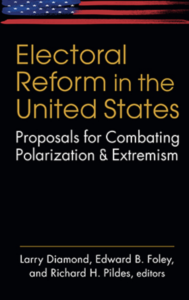 New Book: Electoral Reform in the United States: Proposals for Combating Polarization and Extremism: In the midst of the political ugliness that has become part of our everyday reality, are there steps that can be taken to counter polarization and extremism—practical steps that are acceptable across the political spectrum? To answer that question, starting from the premise that the way our political processes are designed inevitably creates incentives for certain styles of politics and candidates, the Task Force on American Electoral Reform spent two years exploring alternative ideas for reforming key aspects of the US electoral process. The results of their work are presented in this essential book. Larry Diamond is Mosbacher Senior Fellow at the Freeman Spogli Institute and William L. Clayton Senior Fellow at the Hoover Institution, Stanford University. Edward B. Foley is Ebersold Chair in Constitutional Law and director of Election Law program in the Moritz College of Law, Ohio State University. Richard H. Pildes is Sudler Family Professor of Constitutional Law in the School of Law, New York University.
New Book: Electoral Reform in the United States: Proposals for Combating Polarization and Extremism: In the midst of the political ugliness that has become part of our everyday reality, are there steps that can be taken to counter polarization and extremism—practical steps that are acceptable across the political spectrum? To answer that question, starting from the premise that the way our political processes are designed inevitably creates incentives for certain styles of politics and candidates, the Task Force on American Electoral Reform spent two years exploring alternative ideas for reforming key aspects of the US electoral process. The results of their work are presented in this essential book. Larry Diamond is Mosbacher Senior Fellow at the Freeman Spogli Institute and William L. Clayton Senior Fellow at the Hoover Institution, Stanford University. Edward B. Foley is Ebersold Chair in Constitutional Law and director of Election Law program in the Moritz College of Law, Ohio State University. Richard H. Pildes is Sudler Family Professor of Constitutional Law in the School of Law, New York University.
Ballot Measures, Legislation & Rulemaking
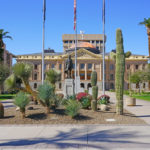 Arizona: Republican lawmakers want to bar the Arizona attorney general from bringing charges against county supervisors who refuse to certify future election results. Rep. Rachel Keshel (R-Tucson) filed House Bill 2440 more than a year after an Arizona grand jury indicted two Republican Cochise County supervisors on felony charges for attempting to delay certification of the county’s 2022 election results over unsubstantiated claims that vote tabulators had been compromised. “Obviously, in the bill it says in good faith – if they have some concerns about the election that they have the right to question, and not just feel forced to certify the election,” Keshel said. However, under Arizona law, a county board of supervisor’s duty to certify an election is considered a ministerial act, meaning they do not have discretion to delay certification or refuse to certify results altogether. Keshel’s bill passed the Arizona House’s Federalism, Military Affairs & Elections Committee on a party-line vote.
Arizona: Republican lawmakers want to bar the Arizona attorney general from bringing charges against county supervisors who refuse to certify future election results. Rep. Rachel Keshel (R-Tucson) filed House Bill 2440 more than a year after an Arizona grand jury indicted two Republican Cochise County supervisors on felony charges for attempting to delay certification of the county’s 2022 election results over unsubstantiated claims that vote tabulators had been compromised. “Obviously, in the bill it says in good faith – if they have some concerns about the election that they have the right to question, and not just feel forced to certify the election,” Keshel said. However, under Arizona law, a county board of supervisor’s duty to certify an election is considered a ministerial act, meaning they do not have discretion to delay certification or refuse to certify results altogether. Keshel’s bill passed the Arizona House’s Federalism, Military Affairs & Elections Committee on a party-line vote.
The House passed a bill that would require non-governmental groups to include the words “Not from a government agency” on mailers. Rep. John Gillette (R-Kingman), the bill’s sponsor, said some outside groups have designed their election-related mail to look like it comes from a county recorder and that confuses voters. “They are not from a government agency, and they are a lot of times misinformation, disinformation, but they mimic very closely,” Gillette said. The Arizona House of Representatives passed House Bill 2006 on Feb. 6 with mostly Republican support; four Democrats also voted for the bill. Gov. Katie Hobbs (D) vetoed a similar bill in 2023 over concerns that rules requiring specific font sizes for the required disclosure were too burdensome. “While I am generally supportive of disclosure in this context, I believe that the specific requirements around text size within this bill create an unreasonable burden on those who are trying to improve voting access in Arizona,” Hobbs wrote in a veto letter. Marson said the new bill doesn’t include that text size requirement. She said the bill also doesn’t include any punishment or enforcement mechanism — something the counties originally sought when they first asked lawmakers to consider the proposal five years ago.
 Arkansas: A bill filed in the state legislature would change how noncitizens’ driver’s licenses are issued and tracked, with the intent of preventing them from voting. House Bill 14-22, known as the “Only Citizens Vote Act,” would introduce new voter registration checks to identify and remove any noncitizens improperly registered to vote. “So, right now, those individuals are not able to vote, and this is setting up a system,” said Jennifer Price, Washington County’s director of elections. “So, when they do receive a driver’s license because they are eligible to receive a driver’s license, their driver’s license will look different than driver’s licenses issued to U.S. citizens.” The bill would also require the state Department of Finance and Administration to send a list of noncitizens with Arkansas driver’s licenses to the secretary of state. “They will then take that list, compare it to the list of registered voters in the state,” Price said. “If they do find a name of an individual who’s on the list of registered voters, then they would notify the county clerk in that county, and then those individuals would be removed from the voter rolls.”
Arkansas: A bill filed in the state legislature would change how noncitizens’ driver’s licenses are issued and tracked, with the intent of preventing them from voting. House Bill 14-22, known as the “Only Citizens Vote Act,” would introduce new voter registration checks to identify and remove any noncitizens improperly registered to vote. “So, right now, those individuals are not able to vote, and this is setting up a system,” said Jennifer Price, Washington County’s director of elections. “So, when they do receive a driver’s license because they are eligible to receive a driver’s license, their driver’s license will look different than driver’s licenses issued to U.S. citizens.” The bill would also require the state Department of Finance and Administration to send a list of noncitizens with Arkansas driver’s licenses to the secretary of state. “They will then take that list, compare it to the list of registered voters in the state,” Price said. “If they do find a name of an individual who’s on the list of registered voters, then they would notify the county clerk in that county, and then those individuals would be removed from the voter rolls.”
The Senate Committee on State Agencies and Governmental Affairs advanced five of six bills that would alter Arkansas’ citizen-led petition process after more than three hours of debate this week. The Senate Committee on State Agencies and Governmental Affairs considered the legislation sponsored by Sen. Kim Hammer, R-Benton, who said his bills all had the goal of enhancing the integrity of Arkansas’ ballot initiative process. “Each of these bills have been prepared working with the secretary of state’s office to assure that each bill safeguards the rights granted under the Constitution, while not infringing on the rights of citizens and their respective groups who want a safe, secure and integrity-driven process through which signatures can be gathered for an initiative.” The five bills advancing out of committee Tuesday: Senate Bill 207 would require canvassers to disclose that petition fraud is a Class A misdemeanor, which is punishable by up to 1 year in prison; Senate Bill 208 would require canvassers to request a photo ID from potential signers; Senate Bill 209 would disqualify signatures collected by canvassers if the secretary of state finds “by a preponderance of evidence” that they violated state law collecting the signatures; Senate Bill 210 would require potential signers to read the ballot title of a petition or have it read aloud to them in the presence of a canvasser. It would also make it a misdemeanor for a canvasser to accept a signature from people who have not read the ballot title or had it read aloud to them in the presence of a canvasser; and Senate Bill 211 would require canvassers to file an affidavit with the secretary of state certifying they complied with the Arkansas Constitution and state laws related to canvassing, perjury, forgery and fraudulent practices in the procurement of petition signatures. Signatures submitted without the affidavit would not be counted. All five bills contain an emergency clause, and if approved by the Legislature, would go into effect immediately upon the governor’s signature.
 Shasta County, California: Supervisors voted to suspend the Shasta County Election Commission’s work until a new lawsuit against the Elections Office is resolved. The 4-1 vote was made by Supervisors in closed session yesterday, February 12. It was announced after the Board returned from a discussion regarding the lawsuit. Supervisor Kevin Crye cast the only dissenting vote. The newest lawsuit against the Elections Office was filed on February 3 by Shasta County activists Dan Ladd and Laura Hobbs. The two identify themselves in a piece of correspondence included in the lawsuit as the President and Vice President of the self-described Shasta Elections Task Force, a private citizen group whose members have engaged in election observation and protests. The Board did not share with the public a reason for suspending the actions of the Elections Commission until the lawsuit is resolved. But a public comment from Elections Commission Chair Ronnean Lund appeared to shed some light on the matter. Lund said she was contacted last week by Deputy Shasta County CEO Stewart Buettell, who told her that he had been instructed not to schedule any Elections Commissions meetings until the Board could discuss the new lawsuit in closed session. “I was informed by him,” Lund told the Board, that “he had been instructed to not (post notice of a scheduled Election Commission meeting) due to the fact that declarations that were completed by myself and another Commissioner concerning the November 2024 election were included as documentation in the lawsuit that was filed against the ROV.”
Shasta County, California: Supervisors voted to suspend the Shasta County Election Commission’s work until a new lawsuit against the Elections Office is resolved. The 4-1 vote was made by Supervisors in closed session yesterday, February 12. It was announced after the Board returned from a discussion regarding the lawsuit. Supervisor Kevin Crye cast the only dissenting vote. The newest lawsuit against the Elections Office was filed on February 3 by Shasta County activists Dan Ladd and Laura Hobbs. The two identify themselves in a piece of correspondence included in the lawsuit as the President and Vice President of the self-described Shasta Elections Task Force, a private citizen group whose members have engaged in election observation and protests. The Board did not share with the public a reason for suspending the actions of the Elections Commission until the lawsuit is resolved. But a public comment from Elections Commission Chair Ronnean Lund appeared to shed some light on the matter. Lund said she was contacted last week by Deputy Shasta County CEO Stewart Buettell, who told her that he had been instructed not to schedule any Elections Commissions meetings until the Board could discuss the new lawsuit in closed session. “I was informed by him,” Lund told the Board, that “he had been instructed to not (post notice of a scheduled Election Commission meeting) due to the fact that declarations that were completed by myself and another Commissioner concerning the November 2024 election were included as documentation in the lawsuit that was filed against the ROV.”
 Grand Junction, Colorado Ballot Measure: The city of Grand Junction will put measures moving its elections to November and giving City Council raises on the ballot for the April 8 municipal election after City Council approved both items Wednesday. The city had been asked by the Mesa County Clerk’s Office, which oversees elections, to move its elections to November instead of April. The City Council voted unanimously last week to put the measure on April’s ballot.
Grand Junction, Colorado Ballot Measure: The city of Grand Junction will put measures moving its elections to November and giving City Council raises on the ballot for the April 8 municipal election after City Council approved both items Wednesday. The city had been asked by the Mesa County Clerk’s Office, which oversees elections, to move its elections to November instead of April. The City Council voted unanimously last week to put the measure on April’s ballot.
 Connecticut: The Government Administration and Elections Committee heard public testimony last week on a proposed constitutional amendment to allow 16-year-olds to apply for voter registration and become active electors upon turning 18. Supporters of the bill, House Joint Resolution 47, argued that pre-registration will increase voter turnout and civic engagement among young people, while opponents raised concerns about implementation challenges and potential confusion for new voters. Jess Zaccagnino, policy counsel for the American Civil Liberties Union of Connecticut (ACLU-CT), testified in favor of the resolution, emphasizing the importance of early voter engagement. “Voting is a foundation of democracy, a right through which we can protect and preserve our other rights,” Zaccagnino wrote in her testimony. “This must include a targeted effort to increase voter turnout among groups with traditionally low participation, like young people.” However, concerns about implementation were raised by the Registrars of Voters Association of Connecticut (ROVAC). Sue W. Larsen, a South Windsor Registrar of Voters and chair of the ROVAC Legislative Committee, submitted testimony outlining potential challenges. “The concept of 16-year-olds registering to vote is not the issue here,” Larsen stated in her testimony. “It is the issue of implementation that has registrars concerned.” She additionally highlighted several logistical hurdles, including necessary software changes, integration with Department of Motor Vehicles registration systems, and maintaining accurate voter rolls. In order to amend the state Constitution, a resolution must be approved by at least three-fourths both the state House and Senate to be placed on the ballot in the next regular state election. A resolution approved by a majority of the membership of each house but less than three-fourths is referred to the General Assembly session held after the next regular state election, where it must be approved by majorities in both houses again before being placed on the ballot.
Connecticut: The Government Administration and Elections Committee heard public testimony last week on a proposed constitutional amendment to allow 16-year-olds to apply for voter registration and become active electors upon turning 18. Supporters of the bill, House Joint Resolution 47, argued that pre-registration will increase voter turnout and civic engagement among young people, while opponents raised concerns about implementation challenges and potential confusion for new voters. Jess Zaccagnino, policy counsel for the American Civil Liberties Union of Connecticut (ACLU-CT), testified in favor of the resolution, emphasizing the importance of early voter engagement. “Voting is a foundation of democracy, a right through which we can protect and preserve our other rights,” Zaccagnino wrote in her testimony. “This must include a targeted effort to increase voter turnout among groups with traditionally low participation, like young people.” However, concerns about implementation were raised by the Registrars of Voters Association of Connecticut (ROVAC). Sue W. Larsen, a South Windsor Registrar of Voters and chair of the ROVAC Legislative Committee, submitted testimony outlining potential challenges. “The concept of 16-year-olds registering to vote is not the issue here,” Larsen stated in her testimony. “It is the issue of implementation that has registrars concerned.” She additionally highlighted several logistical hurdles, including necessary software changes, integration with Department of Motor Vehicles registration systems, and maintaining accurate voter rolls. In order to amend the state Constitution, a resolution must be approved by at least three-fourths both the state House and Senate to be placed on the ballot in the next regular state election. A resolution approved by a majority of the membership of each house but less than three-fourths is referred to the General Assembly session held after the next regular state election, where it must be approved by majorities in both houses again before being placed on the ballot.
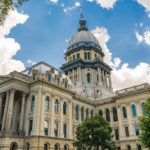 Illinois: Sen. Sally Turner (R-Lincoln) has reintroduced a bill to help make the election process more transparent and uniform for county clerks. Turner told WAND News her suggested changes come from 24 years of personal experience as the Logan County clerk and recorder. The election process is a very important issue to Turner, who has filed the same proposal to standardize election procedures since she became a state senator in 2021. She believes the State Board of Elections should update required election judge training to ensure every judge knows about voter verification, campaign free zones, electioneering, vote-by-mail processing, provisional voting, and ballot processing. Turner’s plan could also require local election leaders to publish vote-by-mail processing rules on their websites 120 days before elections. She said clerks could simply post the state’s legal requirements for vote-by-mail to help the public understand every step of the process. Turner’s bill also calls on election authorities to post updates on their website if there are any reporting delays from election judges five hours after the polls close. The State Board of Elections would be required to audit vote-by-mail ballots received after elections as well. Turner’s plan states the audit would cover 5% of election authorities in Illinois to review their handling and processing procedures for vote-by-mail applications, certification envelopes and returned envelopes.
Illinois: Sen. Sally Turner (R-Lincoln) has reintroduced a bill to help make the election process more transparent and uniform for county clerks. Turner told WAND News her suggested changes come from 24 years of personal experience as the Logan County clerk and recorder. The election process is a very important issue to Turner, who has filed the same proposal to standardize election procedures since she became a state senator in 2021. She believes the State Board of Elections should update required election judge training to ensure every judge knows about voter verification, campaign free zones, electioneering, vote-by-mail processing, provisional voting, and ballot processing. Turner’s plan could also require local election leaders to publish vote-by-mail processing rules on their websites 120 days before elections. She said clerks could simply post the state’s legal requirements for vote-by-mail to help the public understand every step of the process. Turner’s bill also calls on election authorities to post updates on their website if there are any reporting delays from election judges five hours after the polls close. The State Board of Elections would be required to audit vote-by-mail ballots received after elections as well. Turner’s plan states the audit would cover 5% of election authorities in Illinois to review their handling and processing procedures for vote-by-mail applications, certification envelopes and returned envelopes.
 Indiana: A bill headed to the House would ban the use of student IDs to verify a person’s identity when voting. Students at public colleges and universities in Indiana have been allowed to use their IDs when casting a ballot for about two decades. Republicans pushing the bill have offered no evidence of any issues surrounding the use of student IDs for voting. Lawmakers like Sen. Greg Goode (R-Terre Haute) simply said that student IDs don’t have the same rigor as other allowable forms of identification. “It was never intended to be used off campus,” Goode said. Under current law, not any student ID can be used for voting. In addition to coming from an Indiana public college or university, it must also show the person’s name, their photograph and have an expiration date. Sen. J.D. Ford (D-Indianapolis) said Indiana’s real crisis is its low voter turnout — which won’t be helped by further restricting access to the polls. “Senate Bill 10 is not about securing elections — it’s about choosing who gets to participate in those elections,” Ford said. Indiana regularly has one of the worst voter turnout rates in the country. The Senate approved the bill 39-11, with Sen. Greg Walker (R-Columbus) joining Democrats in opposition.
Indiana: A bill headed to the House would ban the use of student IDs to verify a person’s identity when voting. Students at public colleges and universities in Indiana have been allowed to use their IDs when casting a ballot for about two decades. Republicans pushing the bill have offered no evidence of any issues surrounding the use of student IDs for voting. Lawmakers like Sen. Greg Goode (R-Terre Haute) simply said that student IDs don’t have the same rigor as other allowable forms of identification. “It was never intended to be used off campus,” Goode said. Under current law, not any student ID can be used for voting. In addition to coming from an Indiana public college or university, it must also show the person’s name, their photograph and have an expiration date. Sen. J.D. Ford (D-Indianapolis) said Indiana’s real crisis is its low voter turnout — which won’t be helped by further restricting access to the polls. “Senate Bill 10 is not about securing elections — it’s about choosing who gets to participate in those elections,” Ford said. Indiana regularly has one of the worst voter turnout rates in the country. The Senate approved the bill 39-11, with Sen. Greg Walker (R-Columbus) joining Democrats in opposition.
 Maine: Representative Steve Foster (R-Dexter) has introduced a bill that would put a unique identifier on each ballot in Maine. Voters could then keep that identifier and track their ballot’s progress. But critics say that information potentially could be tracked by others to determine how you voted. Despite those concerns, the bill’s sponsor insists the current system needs more integrity. “Concerned voters can record their ballot’s identifier, and that’s when they vote in later view how their votes were,” Foster said. “LD313 would serve to improve voters’ confidence with the use of electronic voting machines and will prove the integrity of the system of tabulation in the state.” “This takes away the fundamental democratic value of secret ballots,” Deputy Secretary of State Emily Cook said. “This is a recipe for conspiracy theories and voter intimidation rather than an increase in voter confidence. It would undermine our democracy, and it is on this point that we most strongly object to this proposal.” Critics are also concerned about the cost of this program, which local towns and cities would have to pay for.
Maine: Representative Steve Foster (R-Dexter) has introduced a bill that would put a unique identifier on each ballot in Maine. Voters could then keep that identifier and track their ballot’s progress. But critics say that information potentially could be tracked by others to determine how you voted. Despite those concerns, the bill’s sponsor insists the current system needs more integrity. “Concerned voters can record their ballot’s identifier, and that’s when they vote in later view how their votes were,” Foster said. “LD313 would serve to improve voters’ confidence with the use of electronic voting machines and will prove the integrity of the system of tabulation in the state.” “This takes away the fundamental democratic value of secret ballots,” Deputy Secretary of State Emily Cook said. “This is a recipe for conspiracy theories and voter intimidation rather than an increase in voter confidence. It would undermine our democracy, and it is on this point that we most strongly object to this proposal.” Critics are also concerned about the cost of this program, which local towns and cities would have to pay for.
 Mississippi: The Senate has approved a bill that would give residents a chance to cast ballots up to 15 days before an election. Sen. Jeremy England’s legislation, called the “In-Person Early Voting Act,” would allow registered electors to vote at their local circuit clerk’s office without an excuse in the days leading up to the polls opening. The Republican from Vancleave argued during floor discussions that voters deserve the chance to cast a ballot early without having to issue a reason or justification as to why they cannot exercise their right on Election Day. “We are doing this to allow for our hardworking Mississippians that may have a difficult time getting to the polling place on Election Day,” England said. “Other states recognize that convenience is needed when voting.” If the bill is enacted into law, it will bring an end to Mississippi’s 45-day in-person absentee voting period, which requires people to fall into the state’s set of categories allowing them to cast a ballot early. Current criteria include being over 65 years old or disabled, or providing an “excuse” such as being out of town on Election Day.
Mississippi: The Senate has approved a bill that would give residents a chance to cast ballots up to 15 days before an election. Sen. Jeremy England’s legislation, called the “In-Person Early Voting Act,” would allow registered electors to vote at their local circuit clerk’s office without an excuse in the days leading up to the polls opening. The Republican from Vancleave argued during floor discussions that voters deserve the chance to cast a ballot early without having to issue a reason or justification as to why they cannot exercise their right on Election Day. “We are doing this to allow for our hardworking Mississippians that may have a difficult time getting to the polling place on Election Day,” England said. “Other states recognize that convenience is needed when voting.” If the bill is enacted into law, it will bring an end to Mississippi’s 45-day in-person absentee voting period, which requires people to fall into the state’s set of categories allowing them to cast a ballot early. Current criteria include being over 65 years old or disabled, or providing an “excuse” such as being out of town on Election Day.
 New Hampshire: The House and Senate committees took up two bills that would bar college students from voting with student ID cards, and require them to show a New Hampshire driver’s license or state ID. Senate Bill 223, would remove college ID cards from the list of “valid student identification” that currently can be used to obtain a ballot. That would leave only public and private high school student ID cards as valid forms of student ID at the polls. SB 223 would also allow any New Hampshire student who registers to vote to qualify for in-state tuition in the next academic year, which would override the current requirement that a person must have lived in New Hampshire for 12 uninterrupted months without attending college during that time to qualify for in-state tuition. In the House, lawmakers are considering House Bill 323, which would bar student identification of all types – including high school identification – from being used to obtain ballots and also block out-of-state driver’s licenses. That bill would include an exception for voters who have been on the voter registration checklist for fewer than 63 days. House Bill 289 would also bar a person from claiming domicile here if they are a “legal dependent of a person who does not live in New Hampshire.” Rachel Deane, the Durham town clerk and tax collector and a representative of the New Hampshire City and Town Clerks Association, argued SB 233 does not actually change the law allowing college students to vote – which would require a change in the definition of domicile – but merely eliminates a method for those students to vote. That could mean that students who are otherwise eligible to vote cannot because they don’t have driver’s licenses or state identification, Deane said. The University System of New Hampshire has objected to the bill, arguing that it would drive students to register to vote to obtain the lower in-state tuition, and calculating that it could cost the public universities up to $141.6 million in tuition. “Out-of-state tuition revenue would decrease to unsustainable levels,” USNH wrote in a fiscal note attached to the bill.
New Hampshire: The House and Senate committees took up two bills that would bar college students from voting with student ID cards, and require them to show a New Hampshire driver’s license or state ID. Senate Bill 223, would remove college ID cards from the list of “valid student identification” that currently can be used to obtain a ballot. That would leave only public and private high school student ID cards as valid forms of student ID at the polls. SB 223 would also allow any New Hampshire student who registers to vote to qualify for in-state tuition in the next academic year, which would override the current requirement that a person must have lived in New Hampshire for 12 uninterrupted months without attending college during that time to qualify for in-state tuition. In the House, lawmakers are considering House Bill 323, which would bar student identification of all types – including high school identification – from being used to obtain ballots and also block out-of-state driver’s licenses. That bill would include an exception for voters who have been on the voter registration checklist for fewer than 63 days. House Bill 289 would also bar a person from claiming domicile here if they are a “legal dependent of a person who does not live in New Hampshire.” Rachel Deane, the Durham town clerk and tax collector and a representative of the New Hampshire City and Town Clerks Association, argued SB 233 does not actually change the law allowing college students to vote – which would require a change in the definition of domicile – but merely eliminates a method for those students to vote. That could mean that students who are otherwise eligible to vote cannot because they don’t have driver’s licenses or state identification, Deane said. The University System of New Hampshire has objected to the bill, arguing that it would drive students to register to vote to obtain the lower in-state tuition, and calculating that it could cost the public universities up to $141.6 million in tuition. “Out-of-state tuition revenue would decrease to unsustainable levels,” USNH wrote in a fiscal note attached to the bill.
 New Jersey: GOP members in both chambers have introduced legislation that would broaden the types of documents obtained through the Motor Vehicle Commission that trigger automatic voter registration and require voters to be given an opportunity to register when obtaining firearms purchaser ID cards, hunting licenses, and certain types of permits. Since 2018, New Jersey has allowed residents to automatically register to vote when they obtain a driver’s license, non-driver ID card, or driving permit during a visit to the Motor Vehicle Commission. The opt-out system also provides for automatic voter registration when obtaining some services from the Secretary of State. The Republicans’ bill would extend automatic registration to the Department of Environmental Protection’s fish and wildlife division, requiring residents who obtain hunting licenses, beaver trapping permits, wild turkey permits, or deer permits be given the opportunity to register to vote. It would further require the New Jersey State Police and local police agencies to offer automatic registration to residents obtaining firearms purchaser ID cards or permits to carry handguns.
New Jersey: GOP members in both chambers have introduced legislation that would broaden the types of documents obtained through the Motor Vehicle Commission that trigger automatic voter registration and require voters to be given an opportunity to register when obtaining firearms purchaser ID cards, hunting licenses, and certain types of permits. Since 2018, New Jersey has allowed residents to automatically register to vote when they obtain a driver’s license, non-driver ID card, or driving permit during a visit to the Motor Vehicle Commission. The opt-out system also provides for automatic voter registration when obtaining some services from the Secretary of State. The Republicans’ bill would extend automatic registration to the Department of Environmental Protection’s fish and wildlife division, requiring residents who obtain hunting licenses, beaver trapping permits, wild turkey permits, or deer permits be given the opportunity to register to vote. It would further require the New Jersey State Police and local police agencies to offer automatic registration to residents obtaining firearms purchaser ID cards or permits to carry handguns.
 New Mexico: A bill seeking to allow commissioned law enforcement officers to bring firearms to election polling locations cleared a legislative committee. HB 101 would exempt law enforcement officers from the law prohibiting firearms at polling places. Curry County Sheriff Michael Brockett told House Consumer and Public Affairs committee members that his county is too big “for a small amount of people to police.” A law passed last year bans open-carry firearms at polling places with exceptions, including certified law enforcement officers, a person in a private automobile and a person carrying a concealed firearm who has a valid concealed-carry handgun license. “Agencies are uncertain about how to interpret who is included in the proposed exemptions in HB 101. There are no definitions in the bill clarifying the difference between “commissioned” officers and “certified” officers already covered by statute,” the bill’s Fiscal Impact Report states. Both the Administrative Office of the Court and the New Mexico Department of Justice have concerns with the language in the bill.
New Mexico: A bill seeking to allow commissioned law enforcement officers to bring firearms to election polling locations cleared a legislative committee. HB 101 would exempt law enforcement officers from the law prohibiting firearms at polling places. Curry County Sheriff Michael Brockett told House Consumer and Public Affairs committee members that his county is too big “for a small amount of people to police.” A law passed last year bans open-carry firearms at polling places with exceptions, including certified law enforcement officers, a person in a private automobile and a person carrying a concealed firearm who has a valid concealed-carry handgun license. “Agencies are uncertain about how to interpret who is included in the proposed exemptions in HB 101. There are no definitions in the bill clarifying the difference between “commissioned” officers and “certified” officers already covered by statute,” the bill’s Fiscal Impact Report states. Both the Administrative Office of the Court and the New Mexico Department of Justice have concerns with the language in the bill.
A bill to allow unaffiliated voters to participate in primary elections without having to register for a major party advanced through the Senate Rules Committee on a 6-3 vote. The bill, sponsored in the upper chamber by Sens. Natalie Figuroa (D-Albuquerque) and Majority Floor Leader Peter Wirth (D-Santa Fe), now heads to its second committee: Senate Judiciary. Sen. Crystal Brantley (R-Elephant Butte) sided with Democrats in the vote on Senate Bill 16, saying she represents the people in her district, not just Republicans.
 New York: Lawmakers have introduced a bill that would allow Gov. Kathy Hochul to delay special elections in New York, and therefore the anticipated race to replace Rep. Elise Stefanik in the 21st Congressional District if she is confirmed as UN ambassador. Current law requires the governor to schedule a special election within 90 days of a declared congressional vacancy. A bill carried by Senate Majority Leader Andrea Stewart-Cousins and Assembly Speaker Carl Heastie in their respective houses would provide the governor with the option to delay that to the general election. The bill, and Stewart-Cousins herself, claim the move is meant to streamline election efficiency and increase voter turnout. “The Legislature finds that New York’s current system of filing federal and state elected office vacancies places undue financial and operational burdens on local boards of elections and exacerbates voter confusion and fatigue by asking voters to frequently participate in elections throughout the year, thus resulting in lower voter turnout and decreased participation in the electoral process,” the bill reads. The bill was withdrawn.
New York: Lawmakers have introduced a bill that would allow Gov. Kathy Hochul to delay special elections in New York, and therefore the anticipated race to replace Rep. Elise Stefanik in the 21st Congressional District if she is confirmed as UN ambassador. Current law requires the governor to schedule a special election within 90 days of a declared congressional vacancy. A bill carried by Senate Majority Leader Andrea Stewart-Cousins and Assembly Speaker Carl Heastie in their respective houses would provide the governor with the option to delay that to the general election. The bill, and Stewart-Cousins herself, claim the move is meant to streamline election efficiency and increase voter turnout. “The Legislature finds that New York’s current system of filing federal and state elected office vacancies places undue financial and operational burdens on local boards of elections and exacerbates voter confusion and fatigue by asking voters to frequently participate in elections throughout the year, thus resulting in lower voter turnout and decreased participation in the electoral process,” the bill reads. The bill was withdrawn.
 North Dakota: Lawmakers are considering changes to the state’s recall election laws to create uniform standards for municipalities across the state. Senate Bill 2269, introduced by Sen. Kristin Roers and co-sponsored by several legislators, seeks to standardize recall procedures by increasing petition requirements, mandating justification for recalls and granting local election officials the power to cancel uncontested recall elections. While supporters say the bill will prevent politically motivated recalls and clarify inconsistencies between state law and local home rule charters, critics argue it could make it harder for voters to remove elected officials. The bill seeks to create and enact a new section to chapter 44-08 of the North Dakota Century Code, clarifying recall elections for city governing body members and amending sections related to recall petitions and elections for political subdivision officials. The bill proposes several changes to the recall process, including stricter requirements for initiating a recall election. Currently, only one petition is needed, with signatures totaling 25% of voters from the previous election. Under the proposed amendments, at least 15 petitions must be taken out by qualified voters instead of one. These petitions must then collectively obtain signatures equivalent to 35% of the voters in the most recent election. Another proposed change mandates that recall petitions “must include a stated reason for the recall and be approved as to form before circulation by the Secretary of State.” Rummel said these changes aim to prevent politically motivated recalls. “If you have a personal vendetta against a sitting commissioner, you can’t almost by yourself get that person recalled and drive to a recall election,” he said. He also emphasized the importance of transparency, adding, “You have to tell us a reason, so you can communicate it to the people that you’re trying to get the signatures from.” The bill’s most significant change would allow city auditors or local election officials to cancel recall elections if the recalled official is the only candidate on the ballot. “If the member subject to the recall election is the only individual placed on the ballot for that election, the city auditor shall cancel the election, declare the recall petition ineffective, and the member may continue to serve the remainder of the member’s term,” the bill states. This provision addresses an issue currently facing Dickinson, where Commissioner Jason Fridrich is the only candidate on the ballot after being recalled. Additionally, the bill stipulates that a city governing body member may not be recalled twice in the same term.
North Dakota: Lawmakers are considering changes to the state’s recall election laws to create uniform standards for municipalities across the state. Senate Bill 2269, introduced by Sen. Kristin Roers and co-sponsored by several legislators, seeks to standardize recall procedures by increasing petition requirements, mandating justification for recalls and granting local election officials the power to cancel uncontested recall elections. While supporters say the bill will prevent politically motivated recalls and clarify inconsistencies between state law and local home rule charters, critics argue it could make it harder for voters to remove elected officials. The bill seeks to create and enact a new section to chapter 44-08 of the North Dakota Century Code, clarifying recall elections for city governing body members and amending sections related to recall petitions and elections for political subdivision officials. The bill proposes several changes to the recall process, including stricter requirements for initiating a recall election. Currently, only one petition is needed, with signatures totaling 25% of voters from the previous election. Under the proposed amendments, at least 15 petitions must be taken out by qualified voters instead of one. These petitions must then collectively obtain signatures equivalent to 35% of the voters in the most recent election. Another proposed change mandates that recall petitions “must include a stated reason for the recall and be approved as to form before circulation by the Secretary of State.” Rummel said these changes aim to prevent politically motivated recalls. “If you have a personal vendetta against a sitting commissioner, you can’t almost by yourself get that person recalled and drive to a recall election,” he said. He also emphasized the importance of transparency, adding, “You have to tell us a reason, so you can communicate it to the people that you’re trying to get the signatures from.” The bill’s most significant change would allow city auditors or local election officials to cancel recall elections if the recalled official is the only candidate on the ballot. “If the member subject to the recall election is the only individual placed on the ballot for that election, the city auditor shall cancel the election, declare the recall petition ineffective, and the member may continue to serve the remainder of the member’s term,” the bill states. This provision addresses an issue currently facing Dickinson, where Commissioner Jason Fridrich is the only candidate on the ballot after being recalled. Additionally, the bill stipulates that a city governing body member may not be recalled twice in the same term.
 South Dakota: A bill updating voter registration residency requirements advances out of the House State Affairs Committee. It requires residents to be living in the state for 30 consecutive days before submitting a voter registration form. Thomas Deadrick is the Deputy Secretary of State. He said his office opposed the bill specifically due to the word “consecutive.” “There’s just so many scenarios out there where a person is still trying to be and doing everything to be a resident of this state and they’re taken out of the state for whatever reason. And sometimes the reasons aren’t even really their own reasons as to why they want to leave,” Deadrick said. “It may be because of vacation, a short time work over in another state. Or as one example I like to give is, what if you have a relative who lives in Omaha or Phoenix, and they die on you, and you want to go to the funeral? And you just blew your 30-consecutive.” Proponents countered, saying the bill takes into account the intent of a person to be in the state for 30 consecutive days. HB 1066 passes committee 8-2 and now heads to the floor of the House.
South Dakota: A bill updating voter registration residency requirements advances out of the House State Affairs Committee. It requires residents to be living in the state for 30 consecutive days before submitting a voter registration form. Thomas Deadrick is the Deputy Secretary of State. He said his office opposed the bill specifically due to the word “consecutive.” “There’s just so many scenarios out there where a person is still trying to be and doing everything to be a resident of this state and they’re taken out of the state for whatever reason. And sometimes the reasons aren’t even really their own reasons as to why they want to leave,” Deadrick said. “It may be because of vacation, a short time work over in another state. Or as one example I like to give is, what if you have a relative who lives in Omaha or Phoenix, and they die on you, and you want to go to the funeral? And you just blew your 30-consecutive.” Proponents countered, saying the bill takes into account the intent of a person to be in the state for 30 consecutive days. HB 1066 passes committee 8-2 and now heads to the floor of the House.
The Senate State Affairs Committee killed a bill that would have banned county auditors and finance officers from using vote tabulators or counting machines from tallying election results. Senator John Carley, the author of numerous election-related bills this session says Senate Bill 217 opens the door to more accurate and efficient elections. Numerous state county election officers testified against the bill. Hughes County Finance Officer Thomas Oliva says the machines are valuable for a number of reasons. The bill would have also ended the use voting machines utilized by disabled votes. District 24 Senator Jim Mehlhaff supported sending S-B 217 the 41st Legislative Day, effectively killing the bill.
An amended bill which would change some provisions relating to challenging voter registration advanced through the Senate State Affairs Committee Wednesday. It was brought by Hot Springs Republican Sen. Amber Hulse. “This one isn’t too controversial, and we had a lot of parties involved so I’m excited to have that clear slate,” Hulse said. “We’ll have probably a couple amendments on the floor, but it looks like we have a good path to victory here.” It would allow the Secretary of State, local auditors, or even individual registered voters to file an application challenging an individual right to vote case. If passed, that challenge must take place within one month of election day.
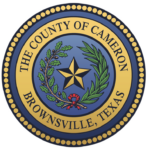 Cameron County, Texas: County commissioners passed a resolution to continue the countywide polling place program. The resolution was passed after Dallas-area Republican Senator Bob Hall introduced a bill into the 89th legislative session that would ban countywide voting. In a summary of Senate Bill 76 that Hall’s team sent to channel 5 News, Hall said some election workers have said countywide voting creates vulnerabilities in election security. Hall also said countywide voting increases the frequency of error and fraud in elections. Cameron County Elections Administrator Remi Garza says there are benefits to keeping the countywide polling program. According to Garza, countywide voting gives voters more places to go vote, and it helps the county during emergencies. Garza said countywide voting also reduced the number of polling locations, which saved the county money. “That helps reduce the number of poll workers that we have to hire, so we’re expecting to see in the long run a cost savings, “Garza said.
Cameron County, Texas: County commissioners passed a resolution to continue the countywide polling place program. The resolution was passed after Dallas-area Republican Senator Bob Hall introduced a bill into the 89th legislative session that would ban countywide voting. In a summary of Senate Bill 76 that Hall’s team sent to channel 5 News, Hall said some election workers have said countywide voting creates vulnerabilities in election security. Hall also said countywide voting increases the frequency of error and fraud in elections. Cameron County Elections Administrator Remi Garza says there are benefits to keeping the countywide polling program. According to Garza, countywide voting gives voters more places to go vote, and it helps the county during emergencies. Garza said countywide voting also reduced the number of polling locations, which saved the county money. “That helps reduce the number of poll workers that we have to hire, so we’re expecting to see in the long run a cost savings, “Garza said.
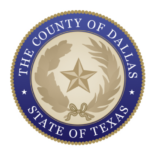 Dallas County, Texas: The Dallas County Commissioners Court voted to approve a contract for a new voter check-in systems vendor ahead of the May local elections. The Dallas County Commissioners voted 4-1 to approve a two-year contract for up to $7.6 million with Know Ink for electronic Pollbook services in a special meeting of the Dallas County Commissioners Court this week. The news comes after Dallas County’s electronic pollbooks from Election Systems and Software glitched during the November election resulting in nearly 4,000 voters receiving and casting ballots in the incorrect precinct. The version of the pollbook software used in the November election has since been decertified by the state of Texas in an unprecedented move. Tuesday’s vote allows the county to order 4,500 Know Ink machines, receive the deliveries by the end of March and begin training poll workers ahead of the May 3 election. Some machines will be held as “backups” to be ready to use if needed. Early voting in the May 3 election begins April 22.
Dallas County, Texas: The Dallas County Commissioners Court voted to approve a contract for a new voter check-in systems vendor ahead of the May local elections. The Dallas County Commissioners voted 4-1 to approve a two-year contract for up to $7.6 million with Know Ink for electronic Pollbook services in a special meeting of the Dallas County Commissioners Court this week. The news comes after Dallas County’s electronic pollbooks from Election Systems and Software glitched during the November election resulting in nearly 4,000 voters receiving and casting ballots in the incorrect precinct. The version of the pollbook software used in the November election has since been decertified by the state of Texas in an unprecedented move. Tuesday’s vote allows the county to order 4,500 Know Ink machines, receive the deliveries by the end of March and begin training poll workers ahead of the May 3 election. Some machines will be held as “backups” to be ready to use if needed. Early voting in the May 3 election begins April 22.
 Utah: House lawmaker, freshman Rep. Doug Fiefia, R-Herriman, unveiled a bill that would make several significant changes to voter requirements and county clerk duties to ensure quicker results on Election Day. For voters, HB445, Revisions to Election Law, would: Eliminate same-day registration by restricting provisional ballots to just those whose voter ID or voter registration is challenged; Require mail-in ballots to arrive before polls close on election night to be counted; and Shorten the time period when voters can correct a ballot with a mismatched signature from up to 11 days after Election Day to six days after. For county election officials, Fiefia’s bill would: Require the finished tabulation of all ballots received before Election Day to be published on election night; Require the finished tabulation of all ballots received on Election Day to be published the following night; and Require officials to publish the unofficial final election results on the Monday after Election Day. Senate Majority Assistant Whip Mike McKell, R-Spanish Fork, said that any election reform bill that emerges from the 2025 session needs a “statutory deadline” for county clerks to report election night results.
Utah: House lawmaker, freshman Rep. Doug Fiefia, R-Herriman, unveiled a bill that would make several significant changes to voter requirements and county clerk duties to ensure quicker results on Election Day. For voters, HB445, Revisions to Election Law, would: Eliminate same-day registration by restricting provisional ballots to just those whose voter ID or voter registration is challenged; Require mail-in ballots to arrive before polls close on election night to be counted; and Shorten the time period when voters can correct a ballot with a mismatched signature from up to 11 days after Election Day to six days after. For county election officials, Fiefia’s bill would: Require the finished tabulation of all ballots received before Election Day to be published on election night; Require the finished tabulation of all ballots received on Election Day to be published the following night; and Require officials to publish the unofficial final election results on the Monday after Election Day. Senate Majority Assistant Whip Mike McKell, R-Spanish Fork, said that any election reform bill that emerges from the 2025 session needs a “statutory deadline” for county clerks to report election night results.
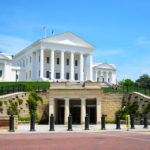 Virginia: The House passed a bill that would keep state election officials from removing active-duty military members serving overseas from voter rolls. The proposal, introduced by Del. Amy Laufer (D–Charlottesville), would allow general registrars to only cancel voter registrations through a written request from the voter or data from an approved source. Laufer told a House subcommittee on Jan. 27 that the bill aims to protect military families overseas and other potential “vulnerable” voters from being improperly removed from the rolls. “It also attempts to streamline procedures by centralizing approved data sources, which mitigates potential errors and disputes related to inaccurate or unverified data,” Laufer said. If the bill is signed into law, registrars can only use data from the Department of Elections or approved state agencies, such as the Department of Motor Vehicles and Department of Health Office of Vital Records. Family members would no longer be allowed to report deaths to registrars, and election officials wouldn’t be allowed to use obituaries to remove someone from the rolls. “This [bill] would prevent that from being a possibility for an individual to use to cancel,” Virginia Elections Commissioner Susan Beals said during the House subcommittee meeting. Beals told the subcommittee that the elections department gets weekly death notices from the vital records department, and registrars have access to a national health database to cancel voter registrations.
Virginia: The House passed a bill that would keep state election officials from removing active-duty military members serving overseas from voter rolls. The proposal, introduced by Del. Amy Laufer (D–Charlottesville), would allow general registrars to only cancel voter registrations through a written request from the voter or data from an approved source. Laufer told a House subcommittee on Jan. 27 that the bill aims to protect military families overseas and other potential “vulnerable” voters from being improperly removed from the rolls. “It also attempts to streamline procedures by centralizing approved data sources, which mitigates potential errors and disputes related to inaccurate or unverified data,” Laufer said. If the bill is signed into law, registrars can only use data from the Department of Elections or approved state agencies, such as the Department of Motor Vehicles and Department of Health Office of Vital Records. Family members would no longer be allowed to report deaths to registrars, and election officials wouldn’t be allowed to use obituaries to remove someone from the rolls. “This [bill] would prevent that from being a possibility for an individual to use to cancel,” Virginia Elections Commissioner Susan Beals said during the House subcommittee meeting. Beals told the subcommittee that the elections department gets weekly death notices from the vital records department, and registrars have access to a national health database to cancel voter registrations.
 Wyoming: Two separate committees in the Legislature voted down matching bills that would have banned all voting machines and required hand count elections. The House Corporations, Elections and Political Subdivisions Committee voted the bill down 8-1 while the same Senate committee did not take a vote on a matching bill at all. House Corporations Chair Rep. Chris Knapp, R-Gillette, said even had they advanced House Bill 215 on Wednesday, he did not believe that it would have gone any farther than that when considering the high quantity of bills the House is considering right now. Rep. Paul Hoeft, R-Powell, agreed and said he has “serious questions” related to the cost of counting all ballots by hand. Multiple members of the Senate Corporations, Elections and Political Subdivisions Committee expressed concerns about the potential downsides to Senate File 184, such as opening the state up to more vulnerabilities by having ballots only counted by hand. The county clerks opposed the bills and requested the committees to cover the proposal in an interim topic. Thermopolis resident Cheryl Aguiar, one of the main hand count proponents, warned against this on Wednesday, mentioning how it would then have to pass through the 2026 budget session. Any non-budget bill must receive a two-thirds vote just to be considered during a budget session.
Wyoming: Two separate committees in the Legislature voted down matching bills that would have banned all voting machines and required hand count elections. The House Corporations, Elections and Political Subdivisions Committee voted the bill down 8-1 while the same Senate committee did not take a vote on a matching bill at all. House Corporations Chair Rep. Chris Knapp, R-Gillette, said even had they advanced House Bill 215 on Wednesday, he did not believe that it would have gone any farther than that when considering the high quantity of bills the House is considering right now. Rep. Paul Hoeft, R-Powell, agreed and said he has “serious questions” related to the cost of counting all ballots by hand. Multiple members of the Senate Corporations, Elections and Political Subdivisions Committee expressed concerns about the potential downsides to Senate File 184, such as opening the state up to more vulnerabilities by having ballots only counted by hand. The county clerks opposed the bills and requested the committees to cover the proposal in an interim topic. Thermopolis resident Cheryl Aguiar, one of the main hand count proponents, warned against this on Wednesday, mentioning how it would then have to pass through the 2026 budget session. Any non-budget bill must receive a two-thirds vote just to be considered during a budget session.
House 245, “Pen and paper ballots,” requires all county clerks to set the default voting method to paper ballots, with an exception provided to voters who have a disability. Laramie County is the only one of Wyoming’s 23 counties to use touch-screen voting machines. Rep. Christopher Knapp, R-Gillette, the sponsor of the bill, said the state needs to have uniform election laws across all 23 counties. Secretary of State Chuck Gray previously expressed support for Knapp’s bill during a House Appropriations Committee meeting, saying he found Laramie County’s elections “unsatisfying.” Laramie County Clerk Debra Lee spoke against the bill during the committee meeting last week, where she told lawmakers it would “upend” her county’s elections. From 2006 to 2013, county voters had the opportunity to weigh in on their preferred method of voting — a majority of them said they preferred the touch-screens, according to Lee.
Legal Updates
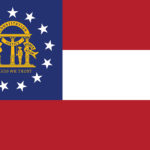 Georgia: Senior Superior Court Judge Gary McCorvey ruled that a Democrat in a disputed state House race will keep his east Georgia seat after McCorvey against his Republican challenger’s claims that dozens of voters were given incorrect ballots in the November election. The decision upholds the victory of Democratic state Rep. Mack Jackson, who received 48 more votes than his Republican opponent, Tracy Wheeler, out of nearly 28,000 votes cast. McCorvey ruled that Wheeler failed to prove enough improper votes to put the result of the election in doubt. McCorvey wrote that only 14 improper votes were verified during a three-day trial last month. The judge found there wasn’t evidence showing that 44 additional ineligible voters — the number Wheeler claimed received ballots that included the House District 128 race but lived outside the district — actually voted in the election. “Succinctly stated, voters being provided with an opportunity to vote in the wrong district does not equate to proof by a preponderance of evidence that such voters actually tainted the election by voting in the election at issue,” McCorvey wrote in his nine-page order.
Georgia: Senior Superior Court Judge Gary McCorvey ruled that a Democrat in a disputed state House race will keep his east Georgia seat after McCorvey against his Republican challenger’s claims that dozens of voters were given incorrect ballots in the November election. The decision upholds the victory of Democratic state Rep. Mack Jackson, who received 48 more votes than his Republican opponent, Tracy Wheeler, out of nearly 28,000 votes cast. McCorvey ruled that Wheeler failed to prove enough improper votes to put the result of the election in doubt. McCorvey wrote that only 14 improper votes were verified during a three-day trial last month. The judge found there wasn’t evidence showing that 44 additional ineligible voters — the number Wheeler claimed received ballots that included the House District 128 race but lived outside the district — actually voted in the election. “Succinctly stated, voters being provided with an opportunity to vote in the wrong district does not equate to proof by a preponderance of evidence that such voters actually tainted the election by voting in the election at issue,” McCorvey wrote in his nine-page order.
 Louisiana: Disability Rights Louisiana (DRLA) voluntarily dismissed a lawsuit challenging four Louisiana laws that they previously said could disenfranchise hundreds of thousands of voters with disabilities who use absentee ballots. The organization chose to dismiss the case after finding no voters with disabilities who were denied their voting rights as a result of the laws during the November and December 2024 elections. The dismissal, if granted without prejudice, will not prevent DRLA from bringing lawsuits in the future if the laws hinder the ability of voters with disabilities to vote. DRLA filed a lawsuit in July 2024 against Louisiana Secretary of State Nancy Landry (R) and Attorney General Elizabeth Murrill (R) challenging several state laws for violating the Voting Rights Act (VRA). Louisiana Acts 380 and 317 prohibit assisting more than one absentee voter. Individuals who deliver absentee ballots or absentee ballot applications for more than one person outside of immediate family members can be criminally prosecuted. Louisiana Acts 302 and 712 make it similarly illegal to serve as a witness for more than one non-family absentee voter. All four were signed into law in June 2024 by Gov. Jeff Landry (R). DRLA argued these laws violate Section 208 of the VRA, which allows voters with disabilities to receive assistance “from a person of the voter’s choice.” Many voters with disabilities who live in nursing homes, group homes or hospitals rely on staff members to help them apply for or return absentee ballots. DRLA claimed that with the laws in effect, those voters will be unlikely to vote if their immediate family members are not available to assist them. It asked the court to block the four statutes. In July, a federal district judge rejected a request to temporarily block the laws, citing a legal doctrine that discourages courts from changing voting rules too close to an election. The laws were therefore in effect during the 2024 presidential election. In October 2024, the defendants moved to dismiss the lawsuit, arguing the plaintiffs had failed to meet procedural requirements like establishing standing and stating a claim for relief.
Louisiana: Disability Rights Louisiana (DRLA) voluntarily dismissed a lawsuit challenging four Louisiana laws that they previously said could disenfranchise hundreds of thousands of voters with disabilities who use absentee ballots. The organization chose to dismiss the case after finding no voters with disabilities who were denied their voting rights as a result of the laws during the November and December 2024 elections. The dismissal, if granted without prejudice, will not prevent DRLA from bringing lawsuits in the future if the laws hinder the ability of voters with disabilities to vote. DRLA filed a lawsuit in July 2024 against Louisiana Secretary of State Nancy Landry (R) and Attorney General Elizabeth Murrill (R) challenging several state laws for violating the Voting Rights Act (VRA). Louisiana Acts 380 and 317 prohibit assisting more than one absentee voter. Individuals who deliver absentee ballots or absentee ballot applications for more than one person outside of immediate family members can be criminally prosecuted. Louisiana Acts 302 and 712 make it similarly illegal to serve as a witness for more than one non-family absentee voter. All four were signed into law in June 2024 by Gov. Jeff Landry (R). DRLA argued these laws violate Section 208 of the VRA, which allows voters with disabilities to receive assistance “from a person of the voter’s choice.” Many voters with disabilities who live in nursing homes, group homes or hospitals rely on staff members to help them apply for or return absentee ballots. DRLA claimed that with the laws in effect, those voters will be unlikely to vote if their immediate family members are not available to assist them. It asked the court to block the four statutes. In July, a federal district judge rejected a request to temporarily block the laws, citing a legal doctrine that discourages courts from changing voting rules too close to an election. The laws were therefore in effect during the 2024 presidential election. In October 2024, the defendants moved to dismiss the lawsuit, arguing the plaintiffs had failed to meet procedural requirements like establishing standing and stating a claim for relief.
 New York: The race to decide the next Public Works Commissioner in Saratoga Springs remains in limbo after a long day in court. Saratoga County State Supreme Court Judge James Walsh heard arguments over more than 100 contested votes for the January special election to decide who will lead the city’s second-largest department through the end of the year. Republican Planning Board chair Chuck Marshall received 1,760 votes. He was the only name on the ballot. At the beginning of court attorneys confirmed that interim commissioner Hank Kuczynski, a Democrat who mounted a last-minute write-in campaign, earned 1,663 uncontested votes. There are 106 contested ballot to be reviewed by Judge Walsh. Attorneys were unable to break them up into categories. More than 60 of those objections were stipulated to have been caused by a voter writing “Democrat” or “D” on the ballot. Questions remain about 25 undervotes and up to 40 overseas military ballots. Depending on the margin following Walsh’s decision counting those votes may be solely academic.
New York: The race to decide the next Public Works Commissioner in Saratoga Springs remains in limbo after a long day in court. Saratoga County State Supreme Court Judge James Walsh heard arguments over more than 100 contested votes for the January special election to decide who will lead the city’s second-largest department through the end of the year. Republican Planning Board chair Chuck Marshall received 1,760 votes. He was the only name on the ballot. At the beginning of court attorneys confirmed that interim commissioner Hank Kuczynski, a Democrat who mounted a last-minute write-in campaign, earned 1,663 uncontested votes. There are 106 contested ballot to be reviewed by Judge Walsh. Attorneys were unable to break them up into categories. More than 60 of those objections were stipulated to have been caused by a voter writing “Democrat” or “D” on the ballot. Questions remain about 25 undervotes and up to 40 overseas military ballots. Depending on the margin following Walsh’s decision counting those votes may be solely academic.
The state’s highest court was asked this week to reverse a ruling against a law that would allow noncitizens to vote in New York City municipal elections by lawyers who argued city officials acted within their legal powers. New York City became the first major U.S. city to grant widespread municipal voting rights to noncitizens in January 2022 — though the law approved by the Democrat-led city council was never implemented due to a legal challenge from Republicans. The city law did not grant noncitizens the right to vote in presidential, congressional or state elections. A trial judge sided with Republican challengers to noncitizen voting in June 2022. And a mid-level state appeals court ruled last year that the law violated the state constitution and a legal requirement to hold a public referendum on the proposal because it changed an election method. The city council appealed to the state Court of Appeals. An attorney for the council told the judges that the city government did not violate the state constitution. “It engaged in a core act of self-governance and the exercise of its home rule powers. This court should hold that the constitution permits the city to make that choice,” attorney Claude Platton said. Arguments this week focused largely on how to interpret specific constitutional language and how to define words like “citizen.” Though Judge Jenny Rivera noted the law could have an big impact if implemented, saying it would “expand the franchise to a very large number of individuals.” A decision is expected in the coming months.
 North Carolina: Just hours after a hearing on Judge Jefferson Griffin’s challenge to more than 65,000 ballots in the state Supreme Court election Judge William Pittman ruled in favor of the North Carolina State Board of Elections on its rejection of challenges to voters of three separate categories — military and overseas voters who did not include photo IDs with their mailed ballots, early and absentee voters who Griffin alleged had incomplete voter registrations, and a group Griffin called “Never Residents” consisting of the children of North Carolina citizens living abroad. “The Court concludes as a matter of law that the Board’s decision was not in violation of constitutional provisions, was not in excess of statutory authority or jurisdiction of the agency, was made upon lawful procedure, and was not affected by other error of law,” Pittman wrote in an order issued. “The court, having reviewed more than 5,000 pages in the record and all of the briefs — have some other information acquired today that I’ll have to review, so I’m going to take it under advisement,” Pittman said at the hearing’s conclusion. “I can promise you I will do it as fast as I can.” Pittman’s determination only concerns matters of state law — a federal appeals court ruled earlier in the week that the case will remain in state court, but reserved jurisdiction over potential federal civil rights issues for the federal courts. Griffin has filed an appeal.
North Carolina: Just hours after a hearing on Judge Jefferson Griffin’s challenge to more than 65,000 ballots in the state Supreme Court election Judge William Pittman ruled in favor of the North Carolina State Board of Elections on its rejection of challenges to voters of three separate categories — military and overseas voters who did not include photo IDs with their mailed ballots, early and absentee voters who Griffin alleged had incomplete voter registrations, and a group Griffin called “Never Residents” consisting of the children of North Carolina citizens living abroad. “The Court concludes as a matter of law that the Board’s decision was not in violation of constitutional provisions, was not in excess of statutory authority or jurisdiction of the agency, was made upon lawful procedure, and was not affected by other error of law,” Pittman wrote in an order issued. “The court, having reviewed more than 5,000 pages in the record and all of the briefs — have some other information acquired today that I’ll have to review, so I’m going to take it under advisement,” Pittman said at the hearing’s conclusion. “I can promise you I will do it as fast as I can.” Pittman’s determination only concerns matters of state law — a federal appeals court ruled earlier in the week that the case will remain in state court, but reserved jurisdiction over potential federal civil rights issues for the federal courts. Griffin has filed an appeal.
 Vermont: Superior Court Judge Samuel Hoar, Jr. dismissed a lawsuit last week from a group challenging a Burlington law allowing noncitizen voting in local elections. Restoring Integrity and Trust in Elections (RITE) filed the lawsuit on behalf of two Vermont voters in June, around a year after Burlington amended its city charter to allow noncitizens who are legal residents in the U.S. to vote in local elections. This includes voting on the education budget and the school board, which were at the center of this case. Hoar granted the city of Burlington’s motion to dismiss RITE’s case last week, rejecting the group’s argument that since the city’s education funding is decided by local voters but paid for by the state, the policy violates the Vermont Constitution, which requires U.S. citizenship to cast a vote on “any matter that concerns the State of Vermont.” The two voters also initially argued that their votes would be diluted by noncitizen votes, meaning that their votes would have less impact on the election results. The judge dismissed the lawsuit with prejudice, meaning the plaintiffs can’t refile it in the future.
Vermont: Superior Court Judge Samuel Hoar, Jr. dismissed a lawsuit last week from a group challenging a Burlington law allowing noncitizen voting in local elections. Restoring Integrity and Trust in Elections (RITE) filed the lawsuit on behalf of two Vermont voters in June, around a year after Burlington amended its city charter to allow noncitizens who are legal residents in the U.S. to vote in local elections. This includes voting on the education budget and the school board, which were at the center of this case. Hoar granted the city of Burlington’s motion to dismiss RITE’s case last week, rejecting the group’s argument that since the city’s education funding is decided by local voters but paid for by the state, the policy violates the Vermont Constitution, which requires U.S. citizenship to cast a vote on “any matter that concerns the State of Vermont.” The two voters also initially argued that their votes would be diluted by noncitizen votes, meaning that their votes would have less impact on the election results. The judge dismissed the lawsuit with prejudice, meaning the plaintiffs can’t refile it in the future.
 Wisconsin: The Wisconsin Supreme Court ruled unanimously that the state’s chief election official, Meagan Wolfe, can stay in her job even though her term has expired, heading off a yearslong effort by some Republicans to oust her. The court found that although Wolfe’s term expired in 2023, the Wisconsin Elections Commission had no duty to reappoint or replace her, because her position isn’t vacant. The case focuses not on Wolfe’s performance as administrator, but rather on the legality of appointees staying on after their terms expire. Wolfe’s four-year term expired in July 2023, and the Republican-led state Senate appeared poised to reject her confirmation if the Wisconsin Elections Commission had voted to reappoint her. All three Republicans on the commission voted to reappoint Wolfe, but the Democratic commissioners abstained from the vote. They cited a 2022 Wisconsin Supreme Court ruling stating that appointees can stay in their roles past the end of their terms. That meant Wolfe wasn’t formally reappointed, and therefore not subject to another Senate confirmation proceeding. Still, Senate leaders took a vote to fire her.
Wisconsin: The Wisconsin Supreme Court ruled unanimously that the state’s chief election official, Meagan Wolfe, can stay in her job even though her term has expired, heading off a yearslong effort by some Republicans to oust her. The court found that although Wolfe’s term expired in 2023, the Wisconsin Elections Commission had no duty to reappoint or replace her, because her position isn’t vacant. The case focuses not on Wolfe’s performance as administrator, but rather on the legality of appointees staying on after their terms expire. Wolfe’s four-year term expired in July 2023, and the Republican-led state Senate appeared poised to reject her confirmation if the Wisconsin Elections Commission had voted to reappoint her. All three Republicans on the commission voted to reappoint Wolfe, but the Democratic commissioners abstained from the vote. They cited a 2022 Wisconsin Supreme Court ruling stating that appointees can stay in their roles past the end of their terms. That meant Wolfe wasn’t formally reappointed, and therefore not subject to another Senate confirmation proceeding. Still, Senate leaders took a vote to fire her.
Opinions This Week
National Opinions: SAVE Act, II | CISA | Citizenship verification | Election security
California: Top two primary
Florida: Local elections
Idaho: Election legislation
Indiana: Early voting
North Carolina: Supreme Court race, II, III
Texas: Vote centers
Utah: Vote by mail| Election legislation
Washington: Ballot measures
Wisconsin: Meagan Wolfe
Upcoming Events
Innovations in Poll Worker Management: Poll Worker Training: Join The Elections Group for the first in a two-part series on improving poll worker programs through innovative strategies. This webinar will focus on practical methods to enhance poll worker training, equipping your workforce to meet the evolving needs of election administration. Participants will explore cutting-edge training strategies, including approaches to engage both new and returning poll workers, the integration of technology in training delivery, and the use of interactive simulations to reinforce critical skills. Panelists include Tonya Pearce, the training and special projects manager for the Orange County, California, Registrar of Voters; Jesse Harris, PhD, a former Georgia election official who is now the CEO and principal consultant of Election Care Solutions, LLC; and Tasmin Swanson, a civic designer at the Center for Civic Design. Join us for this opportunity to gain actionable insights on how to strengthen your poll worker training programs, improve preparedness, and build a more resilient and efficient election workforce. When: Feb. 18, 12pm Eastern. Where: Online
Case Studies on the New Initiatives in the EAC’s Election Technology Division: On February 19, join the U.S. Election Assistance Commission (EAC) for a public hearing, “Case Studies on the New Initiatives in the EAC’s Election Technology Division,” in the agency’s hearing room. During the meeting, EAC staff will provide updates on the agency’s Election Supporting Technology Evaluation Program (ESTEP) and recent pilot efforts from the Field Services Program. Other panelists include election officials and election technology vendors. When: Feb. 19, 1pm Eastern. Where: Online and in Washington, DC.
Katherine Stewart — Money, Lies, and God: Inside the Movement to Destroy American Democracy: Why have so many Americans turned against democracy? In this deeply reported book, Katherine Stewart takes us to conferences of conspiracy-mongers, backroom strategy gatherings, and services at extremist churches, and profiles the people who want to tear it all down. She introduces us to reactionary Catholic activists, atheist billionaires, pseudo-Platonist intellectuals, self-appointed apostles of Jesus, disciples of Ayn Rand, women-hating opponents of “the gynocracy,” pronatalists preoccupied with the dearth of white babies, Covid truthers, militia members masquerading as “concerned moms” and battalions of spirit warriors who appear to be inventing a new style of religion even as they set about attacking democracy at its foundations. Along the way, she provides a compelling analysis of the authoritarian reaction in the United States. She demonstrates that the movement relies on several distinct constituencies, with very different and often conflicting agendas. Stewart’s reporting and comprehensive political analysis helps reframe the conversation about the moral collapse of conservatism in America and points the way forward toward a democratic future. When: Feb. 20, 7pm Eastern. Where: Washington, DC.
Antidemocratic: A Conversation with David Daley: In 1965, voting rights advocates secured the passage of the Voting Rights Act. The law removed some discriminatory barriers that Black and other historically disenfranchised voters faced at the polls. From day one of its passage, however, this legislation has been attacked in state legislatures and the courts — most notably, the U.S. Supreme Court. In “Antidemocratic,” author David Daley outlines the beginning of a movement within the legal system that helped pave the way for the decision in Shelby County v. Holder, a Supreme Court case that gutted the Voting Rights Act. According to Daley, fringe theories about our elections threaten to undermine our democracy and silence voters. In a conversation with CLC’s Senior Vice President Bruce V. Spiva, Daley will discuss what pro-democracy advocates can do to protect the freedom to vote. When: Feb. 21, 1:15pm Eastern. Where: Online
2025 ESRA Call for Proposals: The 9th Annual Summer Conference on Election Science, Reform, and Administration (ESRA) will be held in-person from Monday, June 9th to Wednesday, June 11th at Florida State University in Tallahassee, FL. The conference is interdisciplinary and invites participation from scholars across a variety of fields including political science, public administration, law, public policy, computer science, statistics, engineering and from election administrators. The purpose of the conference is to engage both election practitioners and scholars alike on pressing topics related to U.S. elections by providing a forum for collaboration and exchange that can stimulate policy evaluation and innovation. Unlike traditional academic conferences, ESRA seeks to facilitate a shared space between academics and election professionals so as to encourage the practical applications of scholarly research in the field. We hope that a wide variety of topics will be addressed at the conference. We are particularly interested in new and innovative projects that evaluate the way U.S. elections are currently administered and how they may be reformed. When: Deadline is Feb. 21.
Election Center February Special Workshop: The Election Center Special Workshop will be held in Little Rock, Arkansas. The workshop will run from February 26-28 and will be followed by CERA classes on March 1 & 2. Registration will open the moment the new Election Center website goes live. In the meantime, the hotel room block is open and accepting reservations at a nightly room rate of $139.00 excluding taxes. The workshop will take place at the DoubleTree Downtown Little Rock. The CERA courses offered are: Course 6 (Communications & Public Relations); Course 7 (Enhancing Voter Participation); Course 8 (Implementing New Programs); and Renewal Course 39 (Bipartisanship & Election Administration). When: February 26- March 2. Where: Little Rock, Arkansas.
What Do Documentary Proof of Citizenship Requirements for Voter Registration Accomplish?: The Safeguarding Democracy Project at UCLA promotes research, collaboration, and advocacy under the leadership of UCLA Law Professor Richard L. Hasen; one of the nation’s leading election scholars. The Safeguarding Democracy Project is built upon the premise that tackling issues of the U.S. election integrity must be collaborative: across ideologies, across scholarly disciplines, and as a bridge between theory and practice. This session will feature: Adrian Fontes, Arizona Secretary of State, Walter Olson, Senior Fellow at the Cato Institute, and Nina Perales, Vice President of Litigation, MALDEF (Mexican American Legal Defense and Educational Fund) and be moderated by Richard L. Hasen, (Director, Safeguarding Democracy Project, UCLA). When: March 4, 3:15pm Eastern. Where: Online and Los Angeles
Combating False Election Information Lessons from 2024 and a Look to the Future: The Safeguarding Democracy Project at UCLA promotes research, collaboration, and advocacy under the leadership of UCLA Law Professor Richard L. Hasen; one of the nation’s leading election scholars. The Safeguarding Democracy Project is built upon the premise that tackling issues of the U.S. election integrity must be collaborative: across ideologies, across scholarly disciplines, and as a bridge between theory and practice. This session will feature speakers: Alice Marwick, Director of Research, Data & Society, UNC Chapel Hill, Kate Starbird, University of Washington, and Joshua Tucker, NYU and moderator Richard L. Hasen, (Director, Safeguarding Democracy Project, UCLA). When: March 31 3:15pm Eastern. Where: Online.
Partisan Primaries, Polarization, and the Risks of Extremism: The Safeguarding Democracy Project at UCLA promotes research, collaboration, and advocacy under the leadership of UCLA Law Professor Richard L. Hasen; one of the nation’s leading election scholars. The Safeguarding Democracy Project is built upon the premise that tackling issues of the U.S. election integrity must be collaborative: across ideologies, across scholarly disciplines, and as a bridge between theory and practice. This session will feature speakers: Julia Azari, Marquette University, Ned Foley, The University of Ohio, Moritz College of Law, Seth Masket, Denver University, and Rick Pildes, NYU Law School and moderator Richard L. Hasen, (Director, Safeguarding Democracy Project, UCLA). When: April 10, 3:15pm Eastern. Where: Online
Election Center April Special Workshop: The Election Center April Special Workshop will be held in Pittsburgh. The conference will run April 23-25 and CERA courses will be offered April 26 and 27. The CERA courses offered will be: Course 9 (History III, 1965 to present); Course 10 (Constitutional Law of Elections); and Renewal Course 38 (Leadership in Election Administration). More information available as soon as the new Election Center website goes live. When: April 23-27. Where: Pittsburgh, Pennsylvania.
Election Center Annual Conference: The Election Center Annual Conference will be held in Salt Lake City. The conference will run August 20-22 and CERA courses will be offered August 23 and 24. The CERA courses offered will be: Course 5 (Ethics); Course 6 (Communications & Public Relations); and Two renewal courses to be announced. More information available as soon as the new Election Center website goes live. When: August 20 to 24. Where: Salt Lake City.
Job Postings This Week
electionlineWeekly publishes election administration job postings each week as a free service to our readers. To have your job listed in the newsletter, please send a copy of the job description, including a web link to mmoretti@electionline.org. Job postings must be received by 5pm on Wednesday in order to appear in the Thursday newsletter. Listings will run for three weeks or till the deadline listed in the posting.
Administrative Coordinator (Spanish Language Program), Dallas County, Texas– Assists with the planning and coordinating of day-to-day fiscal, administrative and operational activities for a defined funded program or project to ensure that goals and objectives are accomplished in accordance with established priorities, time limitations, funding limitations or other specifications. Responsibilities: 1. Assists in developing and scheduling program work plan in accordance with specifications and funding limitations; oversees daily operations and coordinates activities of program; determines priorities. 2. Assists in ensuring the service delivery network meets the needs of the intended population, reflects the objectives and intent of the program or project, and meets applicable federal guidelines. 3. Assists in coordinating activities of program with interrelated activities of other programs, departments or staff to ensure optimum efficiency and compliance with appropriate policies, procedures and specifications. 4. Assists in evaluating program effectiveness to develop improved methods; devises evaluation methodology and implements; analyzing results and recommends and/or takes appropriate action. 5. Assists in writing, editing, and coordinating the development of promotional, educational, and training materials, newsletters, or brochures, as appropriate to the program. 6. Assists in collecting and analyzing data; preparing scheduled and special reports; maintaining program/project records and statistical information. 7. Assists with grant and/or proposal writing as appropriate to the objectives and funding nature of the program. 8. Assists with the preparation of periodic reports, financial statements and records on program activities, progress, status or other special reports for management or outside agencies. 9. Performs other duties as assigned. Salary Range: $24.22-$30.22/hour. Deadline: Feb. 24. Application: For the complete job listing and to apply, click here.
Administrative Services Coordinator, Seminole County, Florida – The Administrative Services Coordinator is a key member of the Supervisor of Elections Office, responsible for ensuring smooth administrative operations with a focus on accounting functions, candidate services, and payroll processing. This position requires attention to detail, organizational skills, and the ability to effectively handle multiple responsibilities while maintaining confidentiality and compliance with applicable laws and regulations. This position is responsible for accounts payable and receivable tasks, including processing invoices and payments, reconciling financial transactions and preparing monthly reports for review, assisting with budget preparation, tracking, and forecasting in collaboration with senior staff, ensuring compliance with state and local financial policies and procedures, and oversight of candidate qualifying and maintaining related reports and records. Salary: $45,000 – $50,000 Annually. Application: For the complete job listing and to apply, click here.
Candidate Services Coordinator, Seminole County, Florida – The Candidate Services Coordinator is a key member of the Supervisor of Elections Office, responsible for ensuring smooth administrative operations with a focus on candidate services and assists with accounting functions and payroll processing. This position requires attention to detail, organizational skills, and the ability to effectively handle multiple responsibilities while maintaining confidentiality and compliance with applicable laws and regulations. This position is responsible for managing the candidate qualifying process, serving as primary point of contact for candidates, maintaining accurate records related to candidate filings, financial disclosures, and other required documentation, and coordinating candidate workshops and providing training on election procedures and campaign finance rules. Salary: $36,000 – $46,000 Annually. Application: For the complete job listing and to apply, click here.
County Clerk, Lane County, Oregon– Lane County is seeking an experienced and dynamic leader to serve as County Clerk and Election & Recording Principal Manager, overseeing critical functions that uphold the integrity of our democratic processes and public records. This pivotal role leads a dedicated team committed to excellence, accuracy, and service to our community. As County Clerk, you will: Plan, organize, and conduct all federal, state, and local elections; Oversee voter registration, property tax appeals, and permanent real property records; Manage marriage licensing, domestic partnership registrations, and archived records; Ensure compliance with Federal, State, and Local laws governing elections and records; Lead a team of 14 full-time employees, ensuring exceptional service and operational efficiency; and Prepare and analyze data, manage budgets, and oversee technology solutions that support Clerk operations. This is a fast-paced, high-impact role where you’ll serve as Lane County’s Clerk and Election & Recording Principal Manager, working under the direction of the Director of Operations to deliver services that affect all residents. Why Lane County? Lane County, the fourth most populous county in Oregon, offers a rich and diverse landscape stretching from the Pacific Ocean to the Cascade Mountains. Our county seat, Eugene, is a vibrant community with ample opportunities for living, working, and recreation. We are proud to offer an excellent benefits package and the chance to make a meaningful impact in public service. Salary: $90,625.60 – $133,286.40 Annually. Application: For the complete job listing and to apply, click here.
Deputy Elections Administrator, Collin County, Texas– Collin County is seeking candidates for the position of Deputy Elections Administrator. This position manages and supervises the department by handling the election process and election personnel, assisting with administrative and clerical support, preparing contracts and cost records, assisting in hiring and firing decisions and requisition approval. Related duties include submitting actual cost records for payment, tabulating and reporting votes, supervising early voting coordinators, voter registration coordinators, and other clerical personnel, and acting as the state funds management liaison. Performs related duties as required. Work is performed under the direction of the Elections Administrator. Candidates must possess a broad knowledge, normally acquired through four years of college resulting in a Bachelor’s degree. At least two years of related experience are required. Must possess and maintain a valid Texas Class C Driver’s License and have the ability to read election codes and documents. Starting Salary: $86,701. Application: For the complete job listing and to apply, click here.
Election Specialist, Candidate Services, Palm Beach County, Florida– This position is responsible for the management and execution of services provided to candidates, political committees, electioneering communication organizations, political parties, community development districts, and special taxing districts. This includes establishing and maintaining an organized system for managing the required forms and records associated with filing and qualifying for office, candidate petitions, campaign finance reporting, financial disclosures, initiative petitions, and other related activities. Candidate Services staff must be organized and personable with a great attitude, be able to work well in a team environment, and meet deadlines under pressure. Excellent work ethic, including consistent performance, integrity, reliability, and attendance, is a must. Must be detail-oriented, be able to handle simultaneous projects, and be a self-starter. Salary: $21.63 – $24.04. Application: For the complete job listing and to apply, click here.
Elections Manager, Douglas County, Nebraska– Incumbent works under the direction of the Election Commissioner or designee, providing direction in the management of commission staff and the administration of elections in adherence to Federal, State and Local statutes. Essential Functions: Manage office and field operations (e.g. voter registration, voter education and outreach, community communications, election mapping, computer systems, election databases, candidate filings, ballot preparation, absentee voting, poll worker recruitment and training, polling place management, election day logistics, vote tabulation and reporting, payroll, and purchasing). Establish and maintain effective work relationships with clients, supervisors, County employees, elected officials, attorneys, law enforcement, judges, other agencies, and the public. Comply with Civil Service policies and regulations, collective bargaining agreements, County policies, department policies and laws to create a cooperative, safe, respectful and quality work environment. Supervise assigned staff (e.g. hiring, orienting, training, monitoring, evaluating, recommending personnel actions). Assist in planning, implementation, administration and evaluation of Election Commission plans, policies and procedures. Monitor federal and state legislation related to the election process and recommend changes in practices and procedures. Implement and ensure adherence to federal government regulations governing voter registration and election processes as defined in the Help America Vote Act. Assist in preparing and managing the Election Commission budget. Coordinate Election Commission functions with other departments, outside agencies and private contractors. Use GIS and mapping software, proofing election boundaries and precincts. Promote a safe working environment for employees. Plan and organize a personal work schedule, set priorities and meet deadlines. Oversee counting and canvass boards. Perform special projects. Prepare and maintain various records, reports, correspondence, and other departmental documents. Safely operate a motor vehicle when required to travel on County business. Report to work at assigned work location with regular, consistent attendance. Perform other related duties as assigned and directed. Salary: $6,963.93 – $11,143.93 Monthly. Deadline: March 2. Application: For the complete job listing and to apply, click here.
Elections Manager, Alexandria, Virginia– The Elections Manager directs and coordinates the elections operation in the City of Alexandria. The employee in this class has primary responsibility for directing the conduct of early voting and by-mail ballot processes. The Elections Manager is responsible for properly programming the voting machines to ensure a totally accurate recording and accounting of votes, as well as the security, maintenance, repair and transportation of all voting machines, and for negotiation and arrangement for use of facilities as voting precincts. The Elections Manager serves as the primary supervisor for warehouse inventory and logistics Responsibilities also include hiring and training of election officials to staff the polls and arranging for the printing of ballots. The Elections Manager serves as Acting General Registrar and Director of Elections in the absence of the General Registrar and Director of Elections. The work is performed under the general direction and guidance of the General Registrar and Director of Elections and must meet all guidelines of election law and departmental standards. Salary: $76,232.26 – $121,682.08 Annually. Deadline: Feb. 21. Application: For the complete job listing and to apply, click here.
Elections Warehouse Manager, Dallas County, Texas—Manages warehouse staff and functions, to include, equipment maintenance and repair, and supply inventory. Management Scope: Manages approximately twenty (20) warehouse personnel. Responsibilities: 1. Supervises all personnel assigned to the elections warehouse, to include hiring, directing, evaluating, disciplining and terminating employees. 2. Provides systems training to warehouse personnel and governmental entities that rent equipment from Dallas County. 3. Manages the maintenance of current systems and schedules maintenance calls for election day. 4. Coordinates the early voting process, ensuring equipment is assigned to appropriate locations. 5. Assist with budget preparation. 6. Performs other duties as assigned. Salary Range: $4666-$7279. Deadline: Feb. 27. Application: For the complete job listing and to apply, click here.
Harris Regional Services Technician, Hart InterCivic – A Harris Regional Services Technician responds to all customer requests ranging from training requests to phone support requests, to onsite repair of voting equipment requests. This individual is one of the local customer support routes. The position requires residency in Harris County, Texas. The Regional Service Technician handles all Return Material Authorization (RMA) requests for external customers for all Hart InterCivic Verity products within his/her region and provides on-site customer support and troubleshooting on an as-needed basis. This position will adhere to the Proprietary Information and Intellectual Property Agreement as it defines and communicates this position’s responsibilities to protect the Company’s information and information security. This responsibility extends outside the organization’s premises and outside normal working hours, e.g., in the case of work-from-home. Application: For the complete job listing and to apply, click here.
Information Technology Manager, Sarasota County, Florida– The Information Technology (IT) manager plays a crucial role in overseeing and managing the technological infrastructure essential for conducting secure, efficient and accurate elections. The IT manager is responsible for the general management of the IT department staff and engages in technical, administrative and supervisory work, including interaction with directors, other managers and departments, vendors and county and state agencies. The manager must maintain knowledge of all IT and technical systems used to support the operations of the elections office. Salary Range: $67,912 – $115,460. Application: For the complete job listing and to apply, click here.
IT Assistant Manager, Palm Beach County, Florida– The Assistant IT Manager plays a supportive role in the smooth operation of the IT department, ensuring that both the technical infrastructure and the team are aligned with the organization’s goals. This position involves collaborating closely with the Election Technology Director to oversee the implementation of technology solutions that meet the needs of the organization. The Assistant IT Manager helps maintain an efficient and effective IT environment. Oversee daily operations of the IT department, including help desk operations and performance, troubleshooting issues, and ensuring efficient workflow. Hold department meetings and provide weekly performance summary. Manage IT projects under the direction of the Election Technology Director, ensuring timely completion, budget requirements, and organizational needs. Enforce IT policies and procedures to ensure data security, network access, and system availability. Assist in the management of IT staff by developing skills, coaching, and communicating job expectations. Coordinate vendor renewals, assist with IT budget development, and manage grant applications. Evaluate and assist in maintaining the organization’s disaster recovery and business continuity plans for IT. Assist with IT Public Records requests research and fulfillment. Assist the Election Technology Director in all facets of IT operations. Lead projects and mentor team members. Application: For the complete job listing and to apply, click here.
Language Access & Outreach Coordinator, King County, Washington–This is an amazing opportunity to be engaged in the election process! The Department of Elections is searching for energetic and resourceful professionals who like to “get stuff done”. The Language Access and Outreach Coordinator position in the Elections Department combines an exciting, fast paced environment with the opportunity to cultivate talents and apply a variety of skills. The ideal candidate will thrive in a collaborative, innovative, and fast-paced environment and will not hesitate to roll up both sleeves, work hard, have fun, and get the job done. The Language Services and Community Engagement Team at King County Elections provides language access work for the whole Elections Department, translating election materials into six languages (Chinese, Korean, Russian, Somali, Spanish, and Vietnamese). In addition, the Team works collaboratively across Department and with community to identify and remove barriers to voting. These communities include those who are disabled, experiencing houselessness, immigrants, youth, and those with limited mobility. This team is recruiting a Language Access and Outreach Coordinator who will support the program for the Chinese language. This position provides bilingual assistance, translation, and community outreach support. This individual must be able to read, write, understand, and speak Chinese at the language proficiency testing level used by the Department. In addition, as part of the community engagement program, this individual will participate in voter registration and voter education activities with community partners and provide support to our Voter Education Fund partners. This position will provide language access assistance to our communications team and administrative support to other election work groups as needed. Salary: $38.37 – $48.64 Hourly. Application: For the complete job listing and to apply, click here.
Mail Ballot Elections Supervisor, Dallas County, Texas – Assists with managing the administration and operation of an election program area, to include program planning, supervising the work of others, establishing goals and objectives, developing schedules, priorities and standards for achieving goals, and coordinating and evaluating program activities. Management Scope: Supervises exempt and non-exempt staff. Responsibilities 1. Assists management by planning, organizing, delegating and overseeing the daily operations of one or more areas of responsibility associated with the election process. 2. Oversees the election program area to ensure staffing coverage is adequate, and productivity standards are met and are effective; develops and implements goals and objectives, performance measures and techniques to evaluate programmatic activities; reviews correspondence and reports from local, state and/or federal agencies; analyzes statistical data and prepares and maintains related reports. 3. Researches and maintains comprehensive knowledge and understanding of applicable laws, policies and procedures to effectively communicate with staff, and acts as liaison and departmental representative to elected officials, political representatives, candidates, judges, contracting customers, vendors, general public, and/or other county, state and federal representatives to resolve problems, answer questions, provide assistance and modify policies/procedures. 4. Hires and trains supervisory and support staff, evaluates performance and initiates disciplinary actions; coordinates and monitors scheduling, productivity and workloads. 5. Assists in budget preparation and maintains related data and reports. 6. Performs other duties as assigned. Salary Range: $4666 – $5822. Deadline: Feb. 24. Application: For the complete job listing and to apply, click here.
Manager, Professional Services, HartIntercivic– Project Managers at Hart InterCivic are highly motivated “self-starters” who are enthusiastic about providing exceptional customer service. Working with other members of the Professional Services and Operations teams, the Project Manager directs activity, solves problems, and develops lasting and strong relationships with our customers. Hart InterCivic’s unique and industry-known culture of innovation, transparency, and customer-centric focus creates an environment where team members will continually grow and be challenged to develop their careers. Application: For the complete job listing and to apply, click here.
Physical Security Specialist, Palm Beach County, Florida– This position is responsible for administration of the physical security programs in a manner consistent with Supervisor of Elections Office policies, procedures, quality standards, and applicable local, state, and federal regulations. These programs include conducting facility security risk assessments, assisting with access control, monitoring alarms and CCTV systems, and providing security related training. Must be organized and personable with a great attitude, be able to work well in a team environment, and meet deadlines under pressure. Excellent work ethic, including consistent performance, integrity, reliability, and attendance, is a must. Candidate must be detail-oriented and understand the importance of security and safety for all. Must be available 24/7 365, be able to handle simultaneous projects, and be a self-starter. Application: For the complete job listing and to apply, click here.
Research Scientist, MEDSL– To oversee the data science workflow of the lab’s election-related data collection, processing, and dissemination efforts including assisting the director with designing and implementing research projects, gathering and analyzing data, designing research protocols, and documenting results; managing data science and quality control for the 2018 release of the Elections Performance Index (EPI); acquiring data from government sources and designing protocols to update indicators not provided by government sources; assisting with redistricting data collection/dissemination efforts; working with web designers to update EPI website and creating original content for MEDSL website; onboarding and monitoring the work of students/research support associates; tracking scholarship in the field of election science; and performing other data science/administrative/reporting duties as assigned. MEDSL aims to improve the democratic experience for all U.S. voters by applying scientific principles to how elections are studied and administered. Application: For the complete job listing and to apply, click here.
Senior Deputy Registrar, Alexandria, Virginia – A Senior Deputy Registrar manages the voter registration processes and the electronic pollbook system in the Office of Voter Registration & Elections. An employee in this position coordinates complex voter registration records to ensure compliance with all applicable federal and state election laws. Additionally, they coordinate the training for Election Officers on the electronic pollbook system with the Elections Manager. The Senior Deputy Registrar provides guidance and training to Deputy Registrar Is, IIs and III and Election Officers. The incumbent in this class examines and certifies candidate petitions and investigates complex voter registration scenarios to solve problems that occur at polls on election day. Work requires that all materials meet the guidelines of election law and department standards. Salary: $51,599.60 – $90,802.92 Annually. Deadline: Feb. 21. Application: For the complete job listing and to apply, click here.
Voter Services Clerk, Seminole County, Florida – The Voter Services Clerk serves as the primary customer service representative for the Seminole County Supervisor of Elections Office. This position is responsible for the accurate maintenance and entry of voter registration information, ensuring the integrity and confidentiality of voter data, and providing essential assistance to voters, including answering inquiries and processing voter-related documents. The Clerk will also be involved in various clerical and administrative tasks associated with voter services, ensuring compliance with applicable state and federal election laws. Responsibilities include processing new voter registrations, updates or changes to existing registrations, vote-by-mail ballot requests, and returns, as well as petition verifications and other voter record-related tasks, providing accurate voter registration and election information to the public in person, by phone, or via mail, in accordance with Florida state laws, regulations, and procedures, conducting research to resolve issues related to voter registration records, utilizing sources both within the voter database and external government websites or online resources, ensuring the accuracy and completeness of voter registration records by verifying information, validating signatures on candidate and initiative petitions, maintaining and update street maintenance files to ensure an up-to-date and accurate residential address database for Seminole County. Salary: $17 – $22 Hourly. Application: For the complete job listing and to apply, click here.
Marketplace
electionline provides no guarantees as to the quality of the items being sold and the accuracy of the information provided about the sale items in the Marketplace. Ads are provided directly by sellers and are not verified by electionline. If you have an ad for Marketplace, please email it to: mmoretti@electionline.org